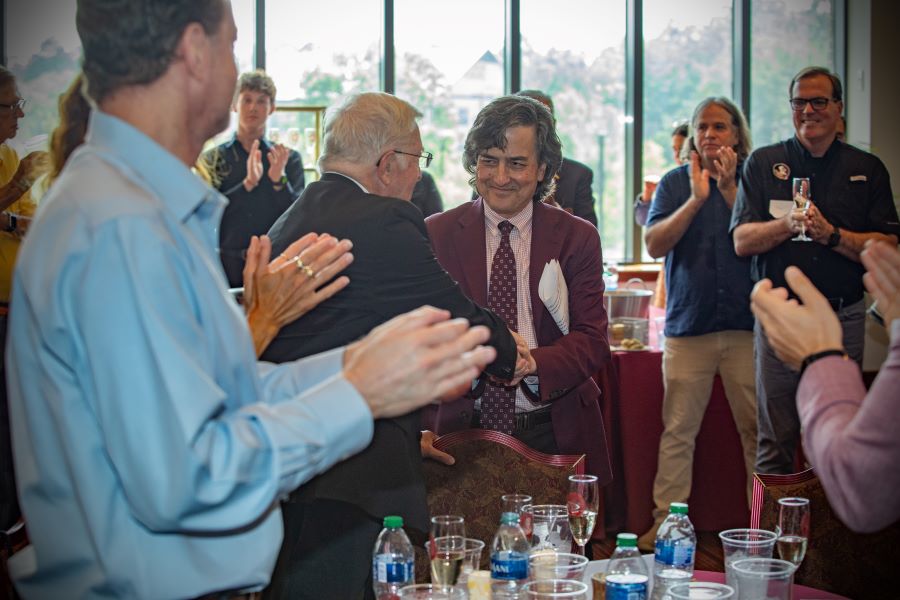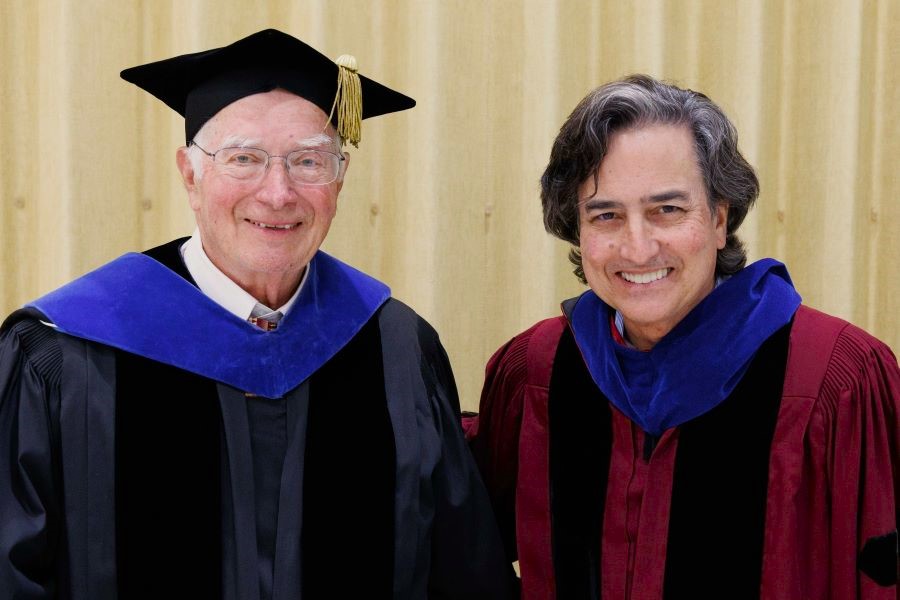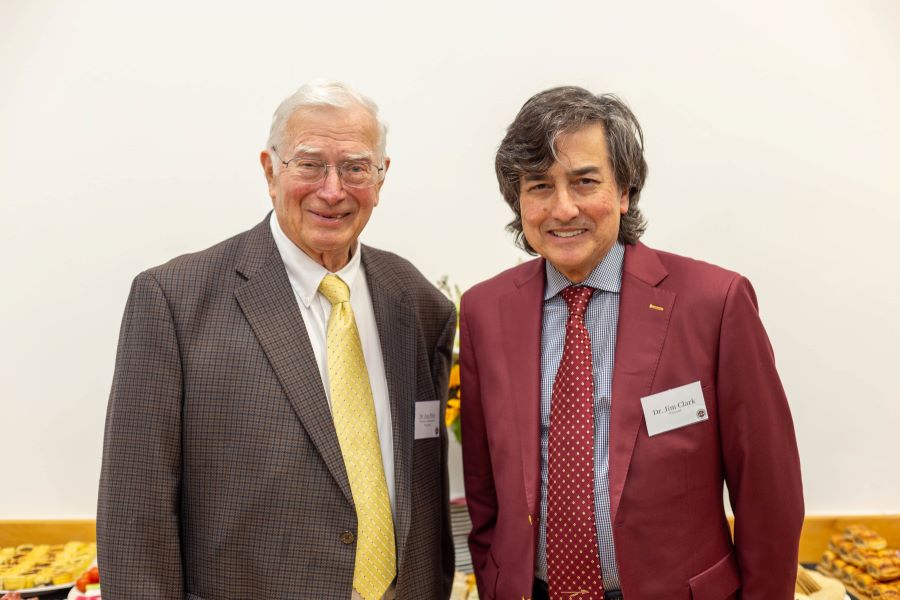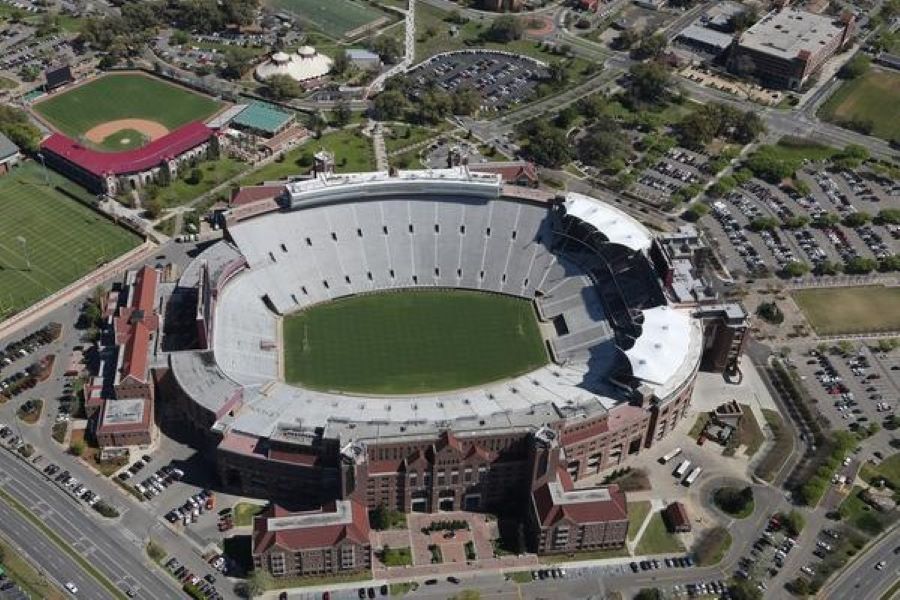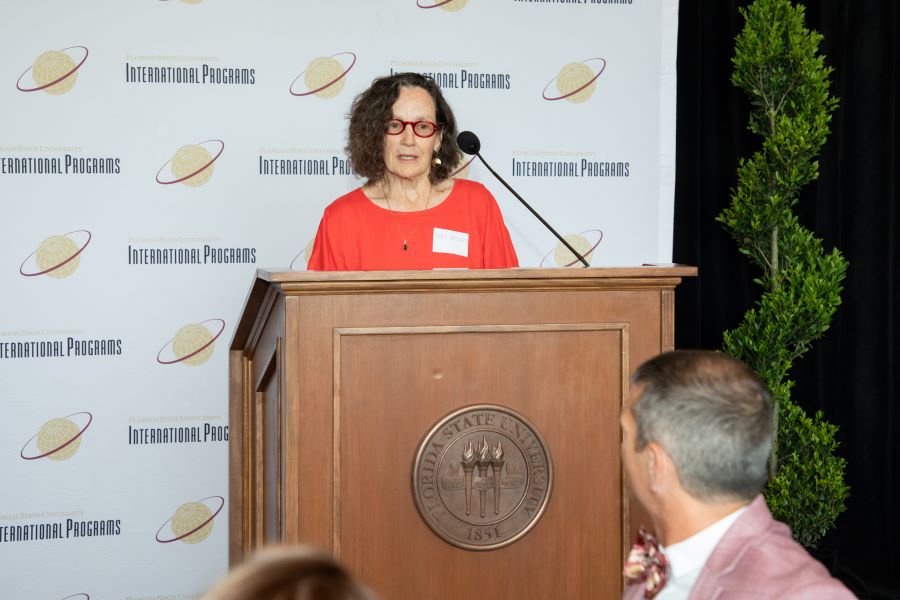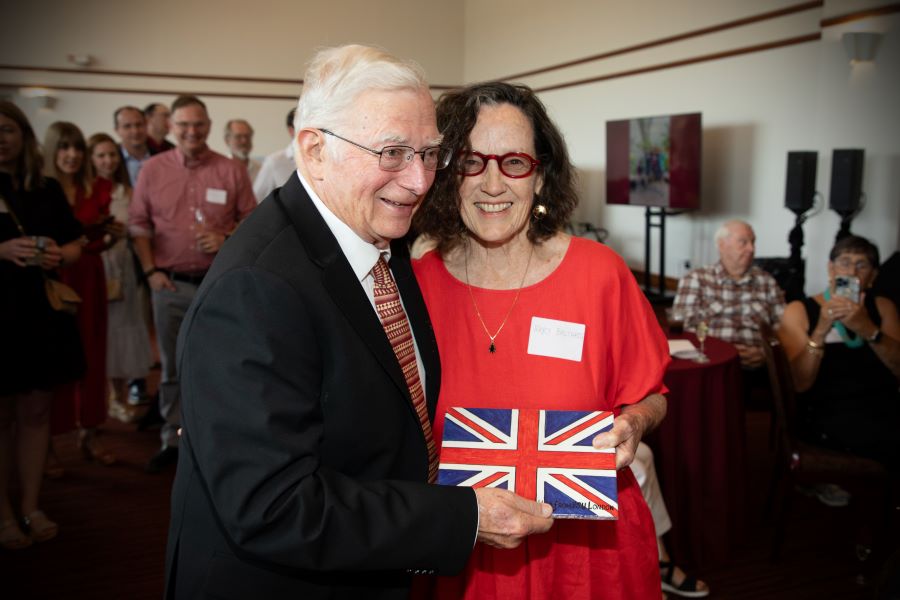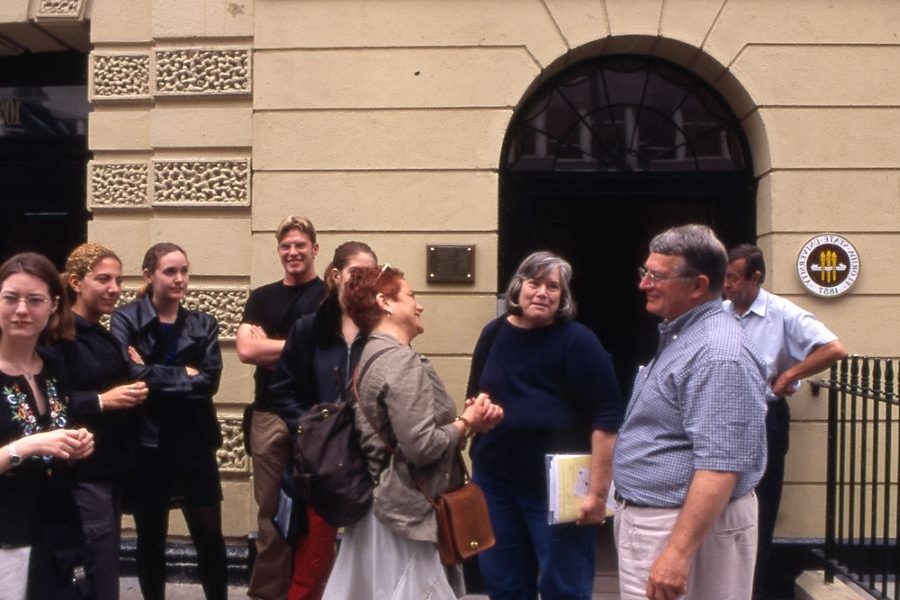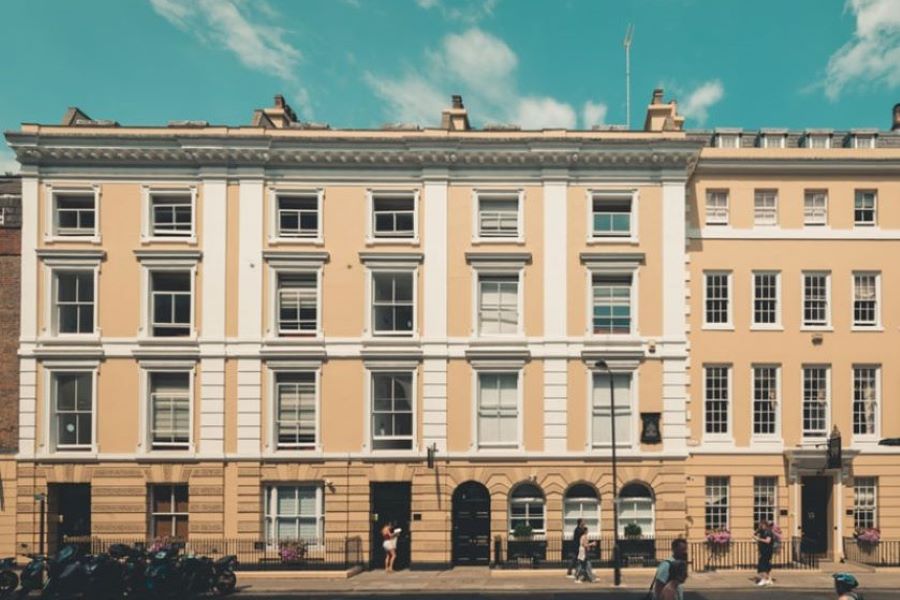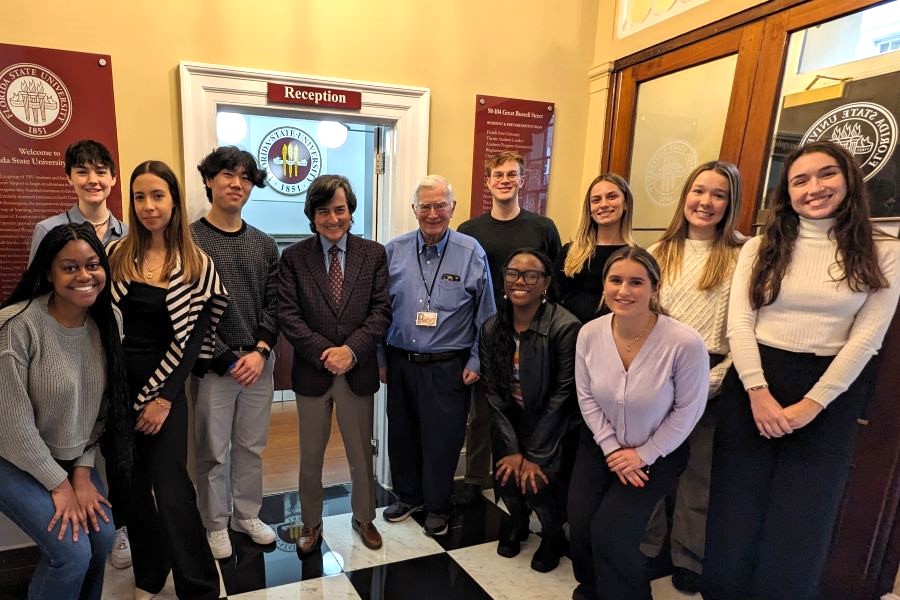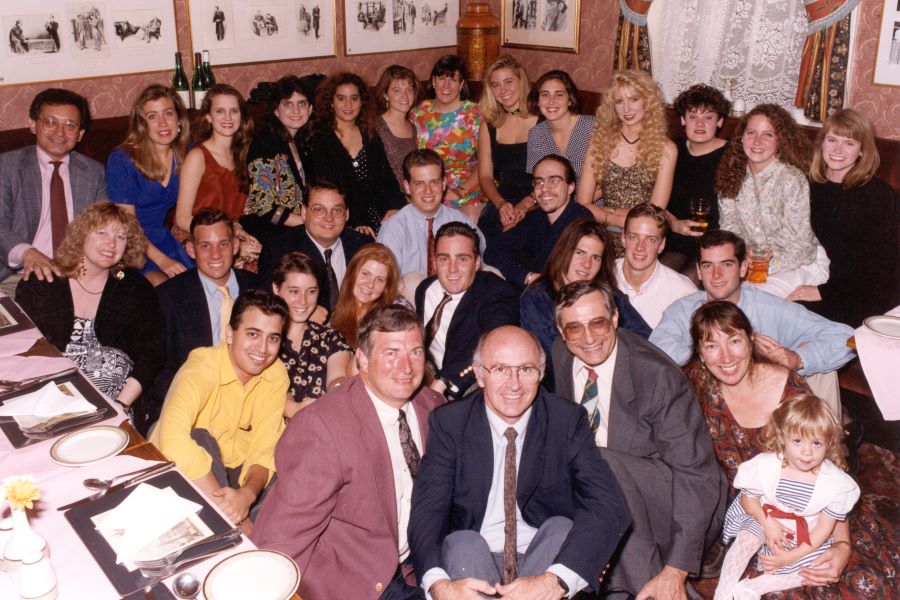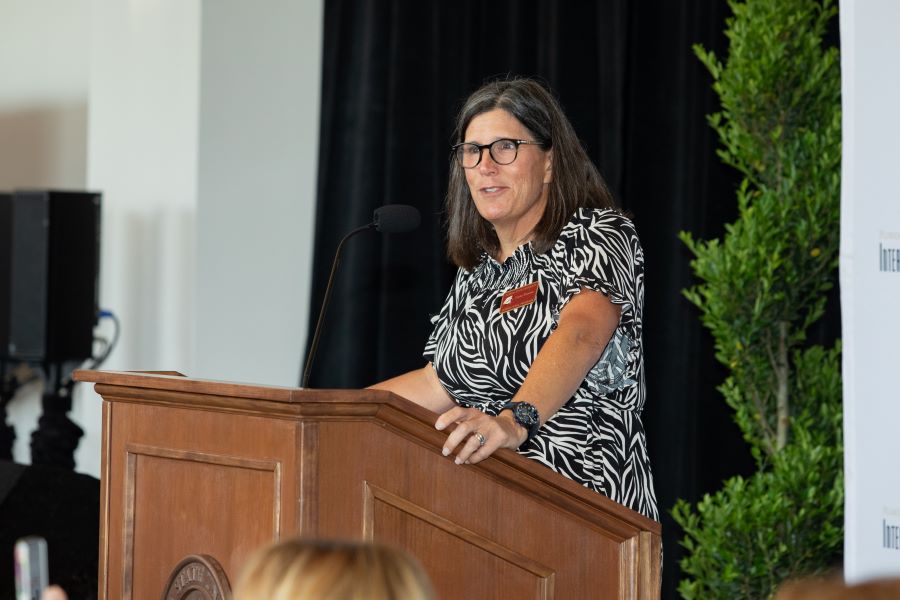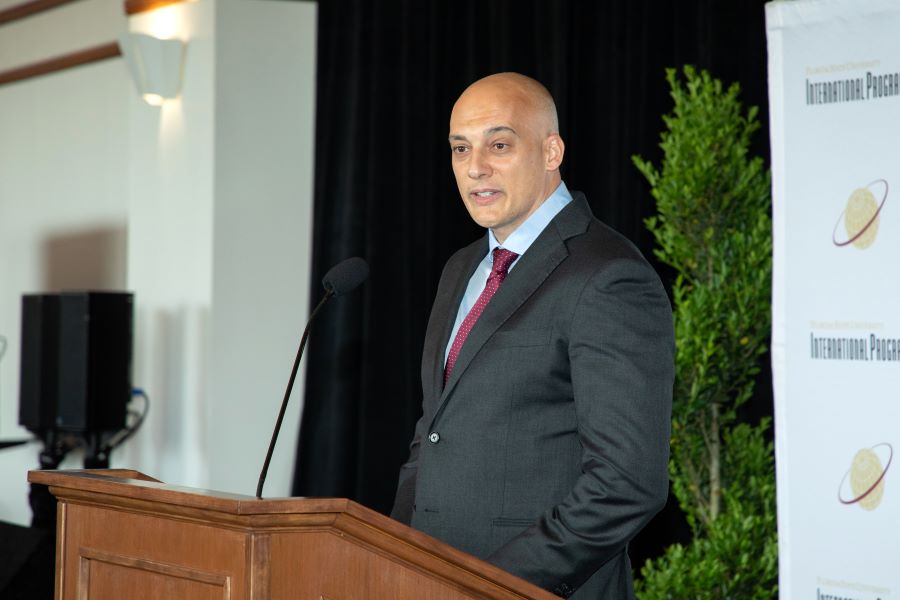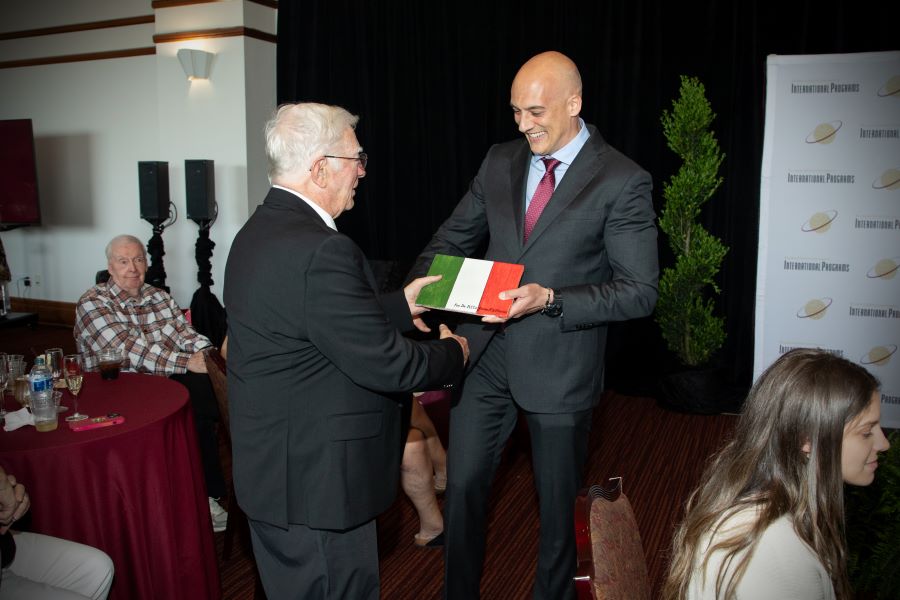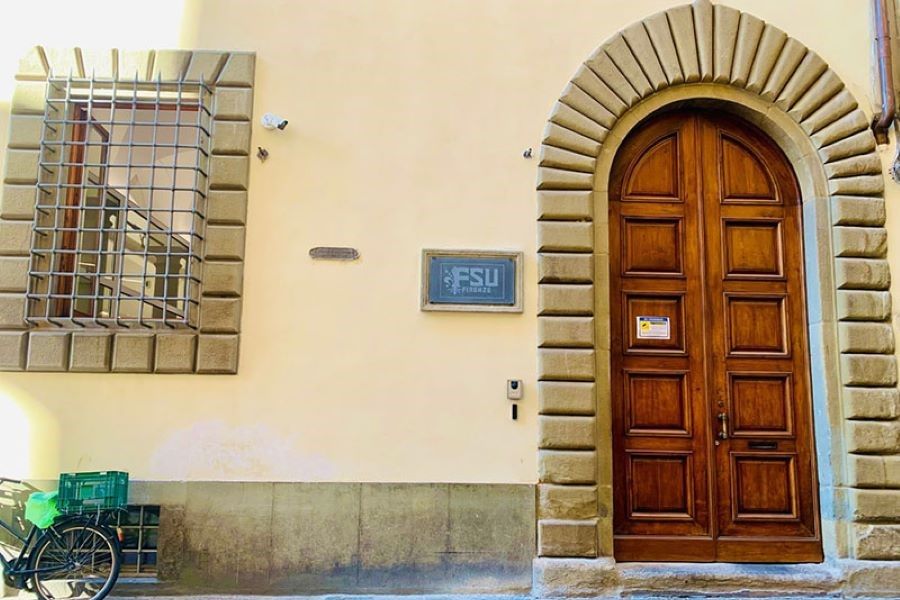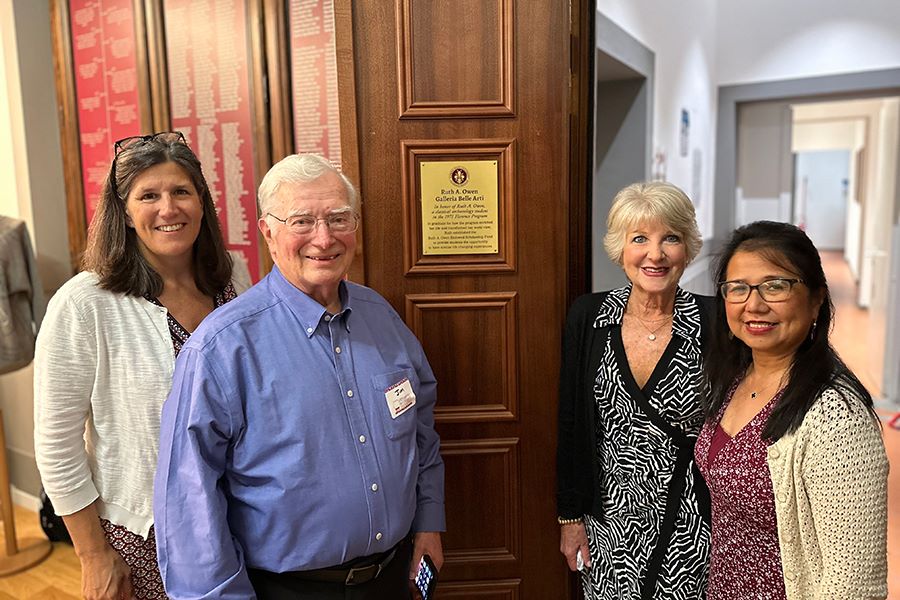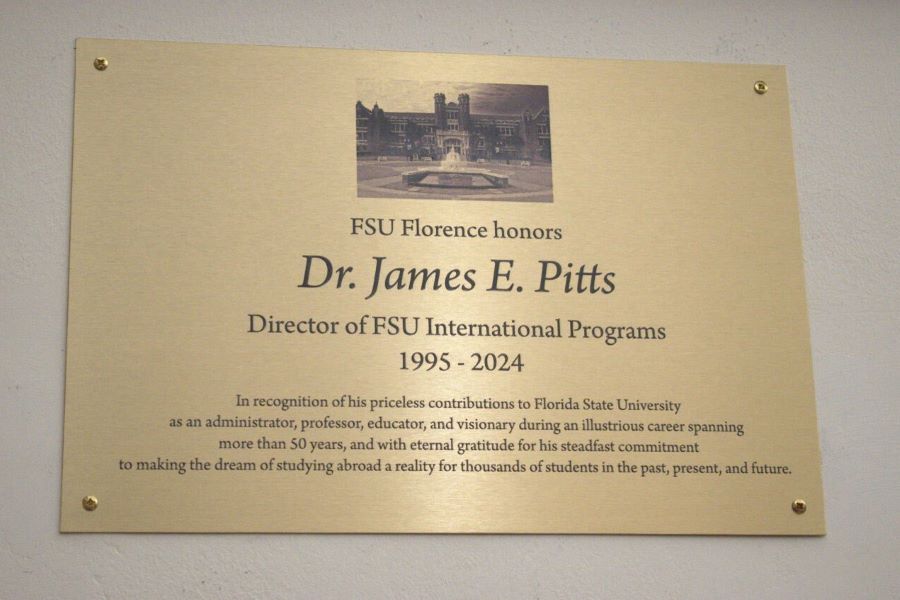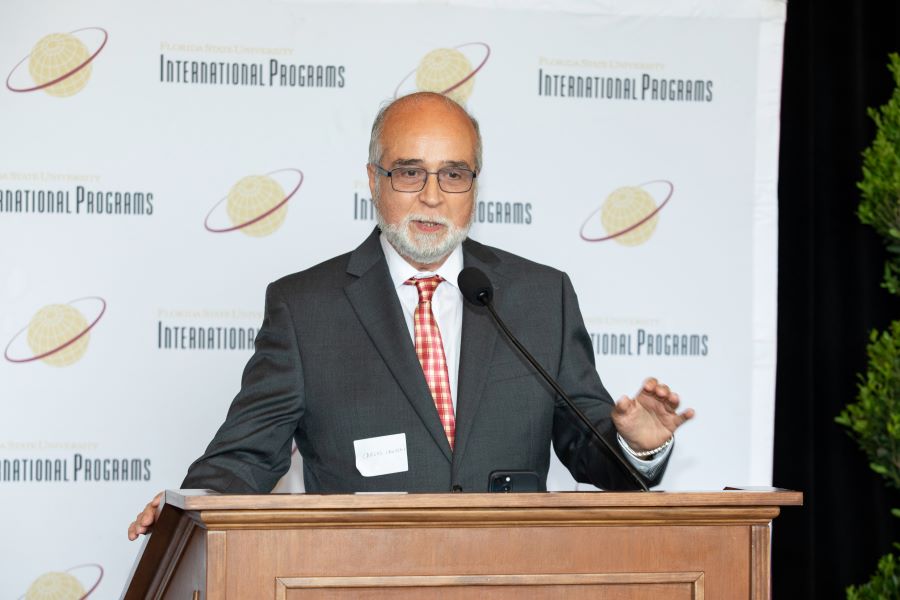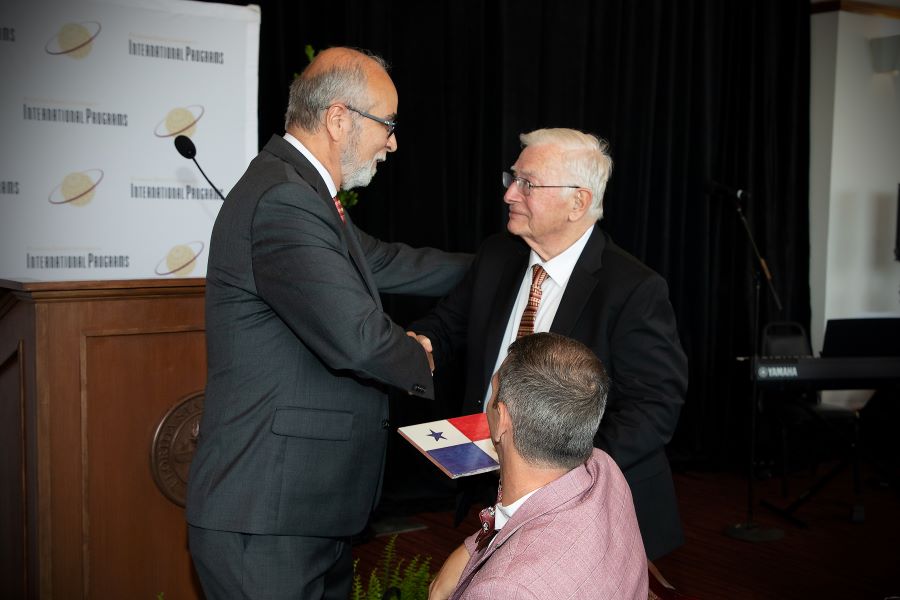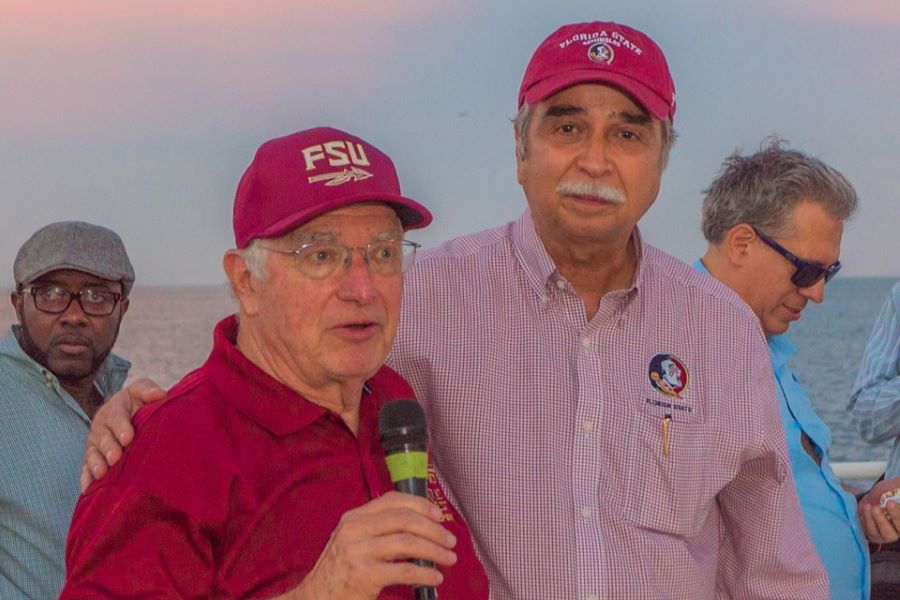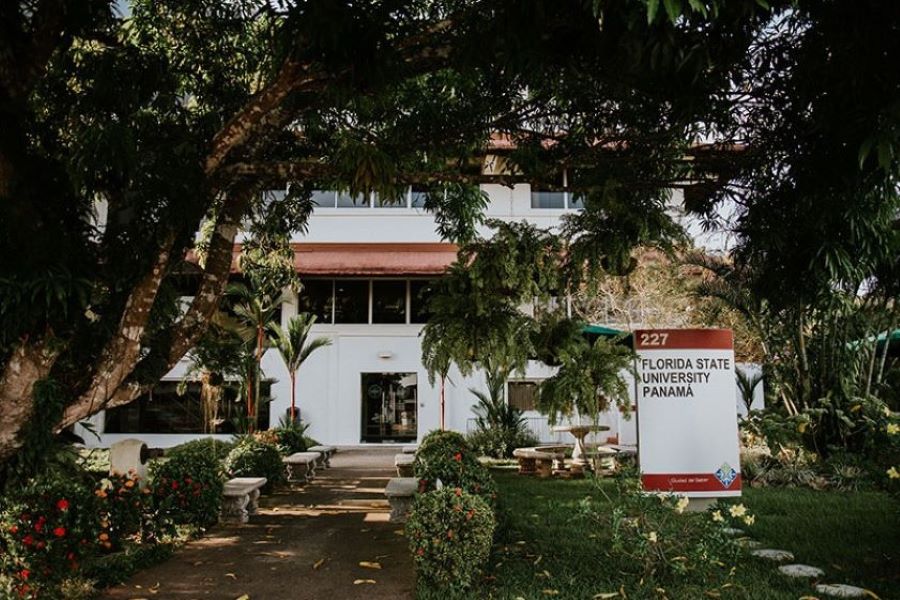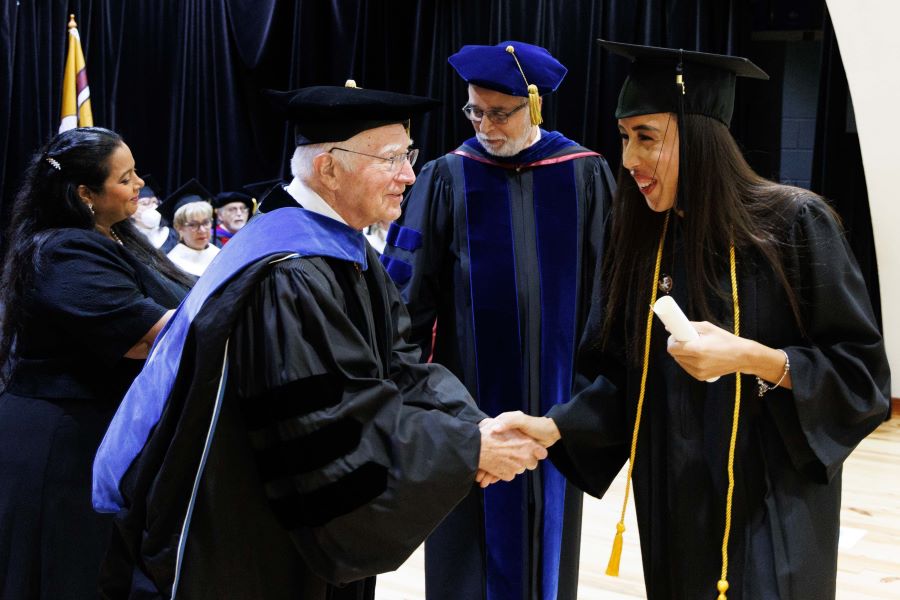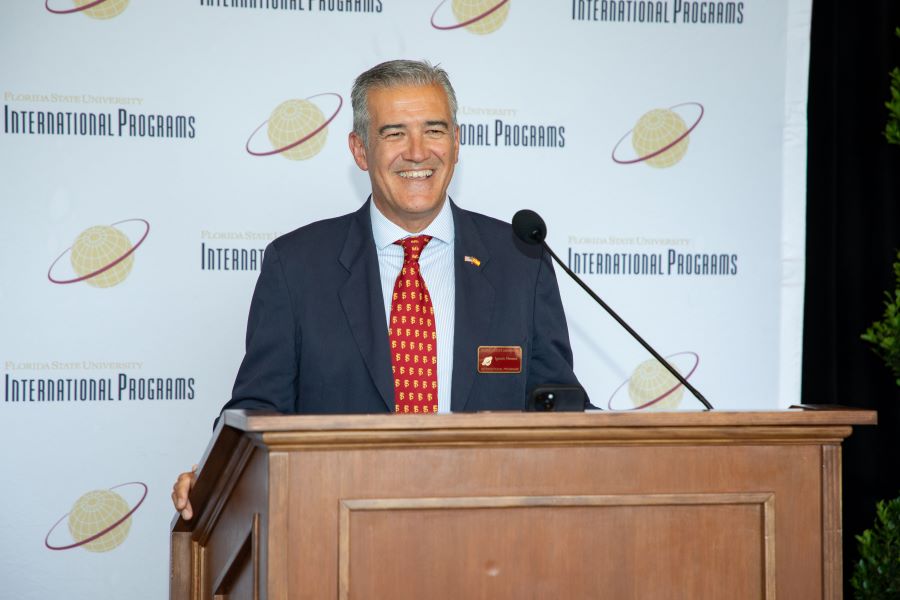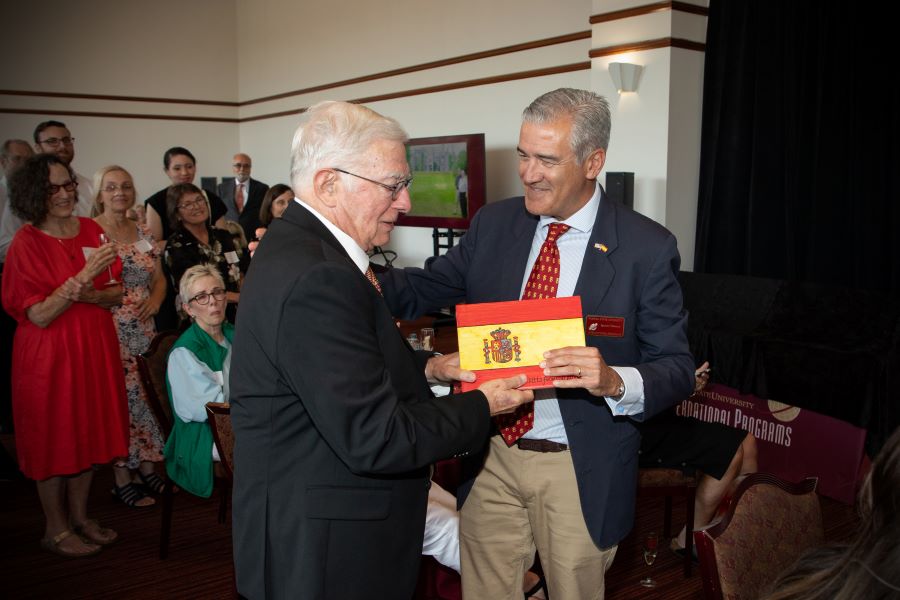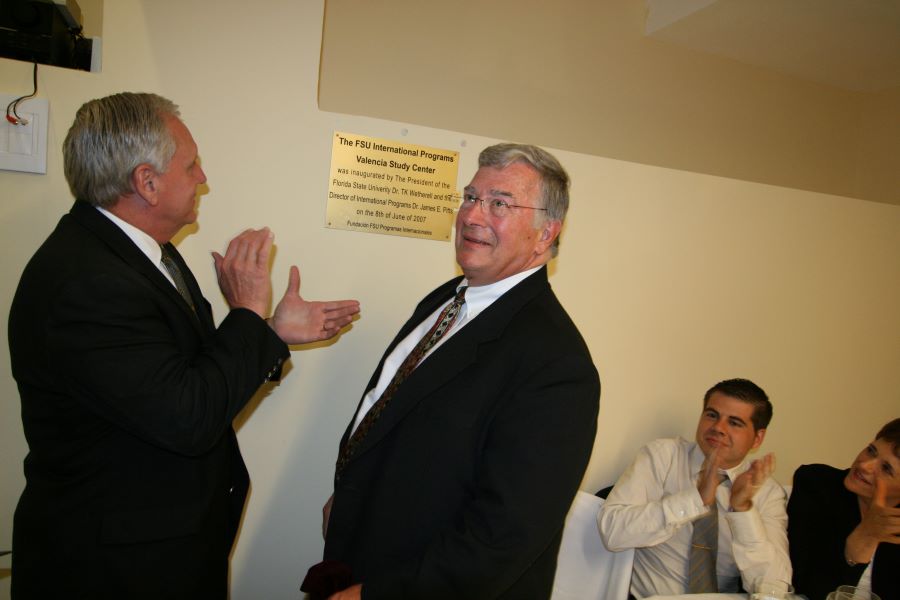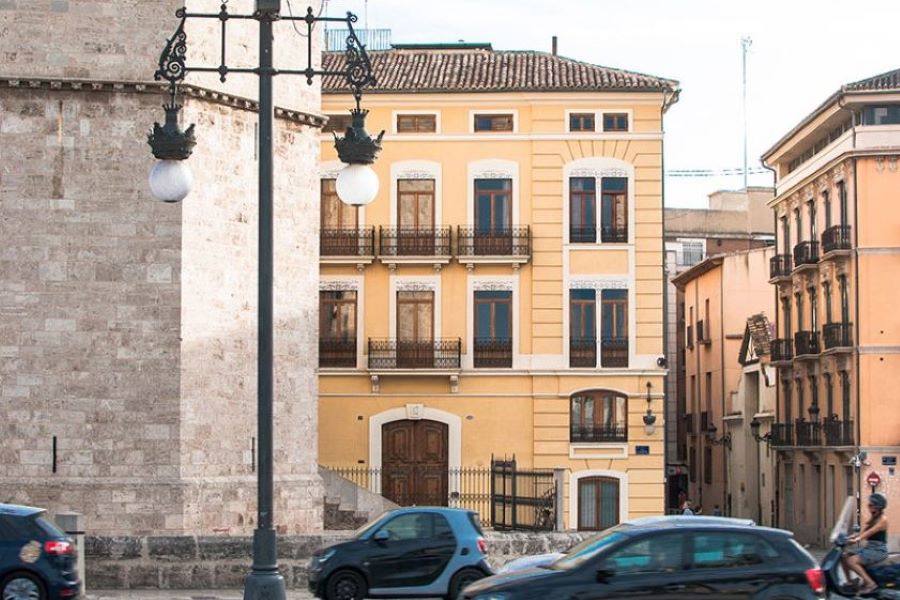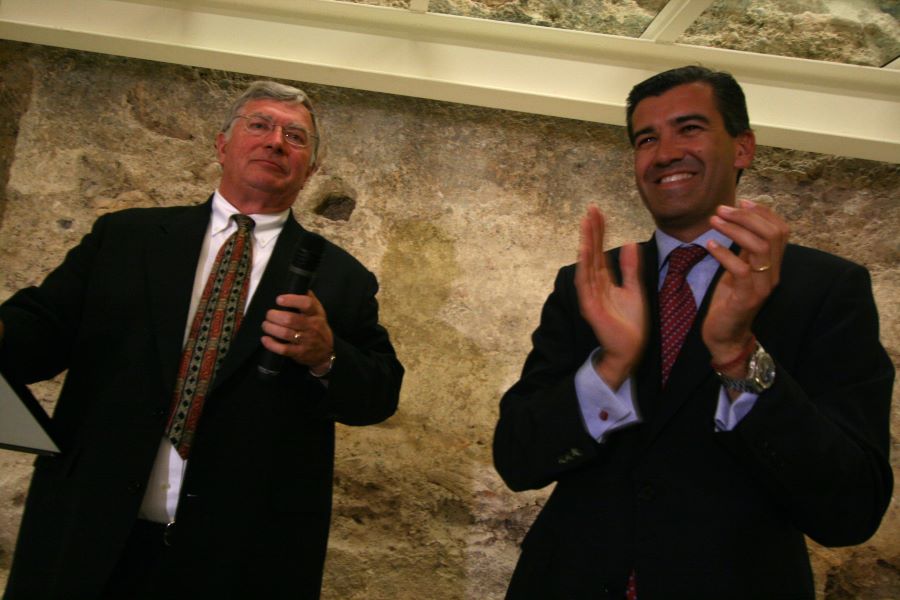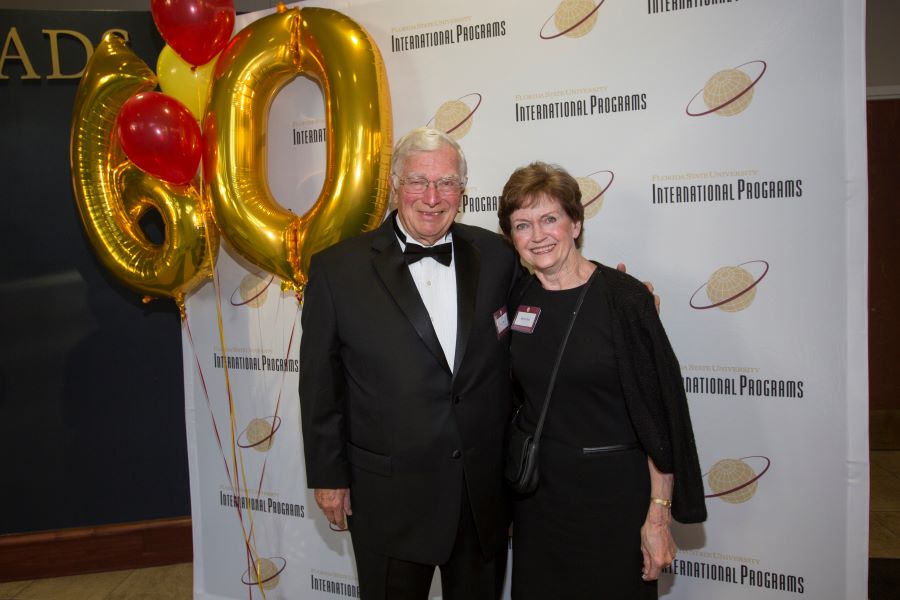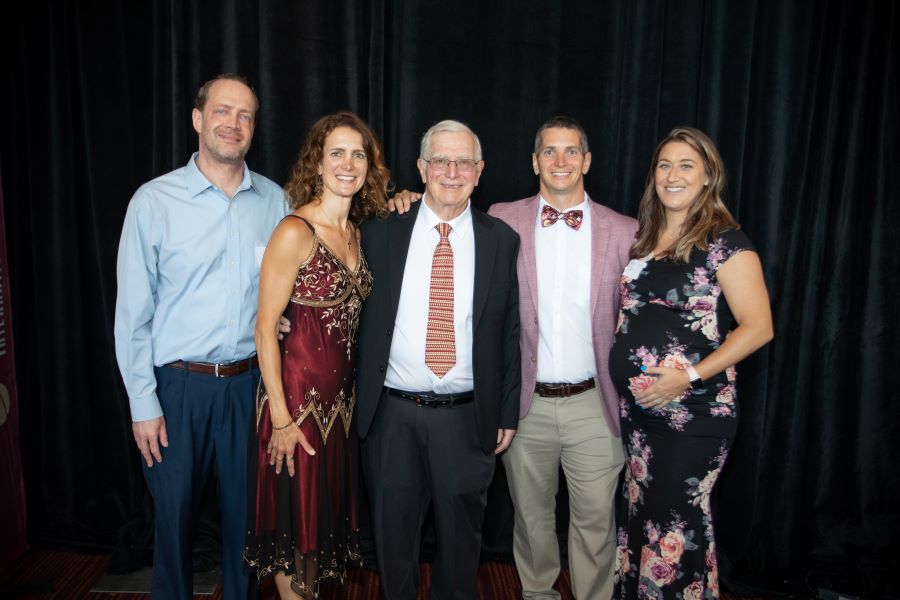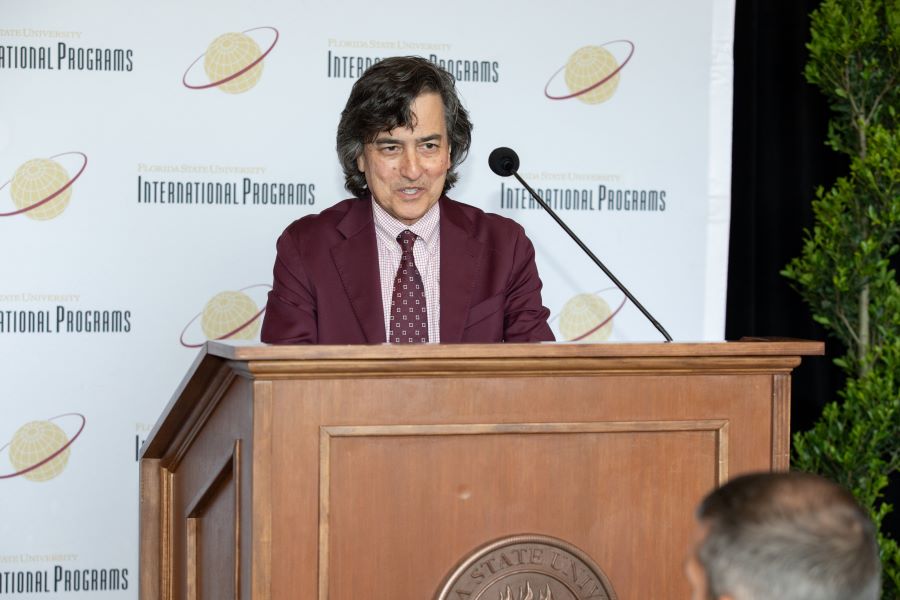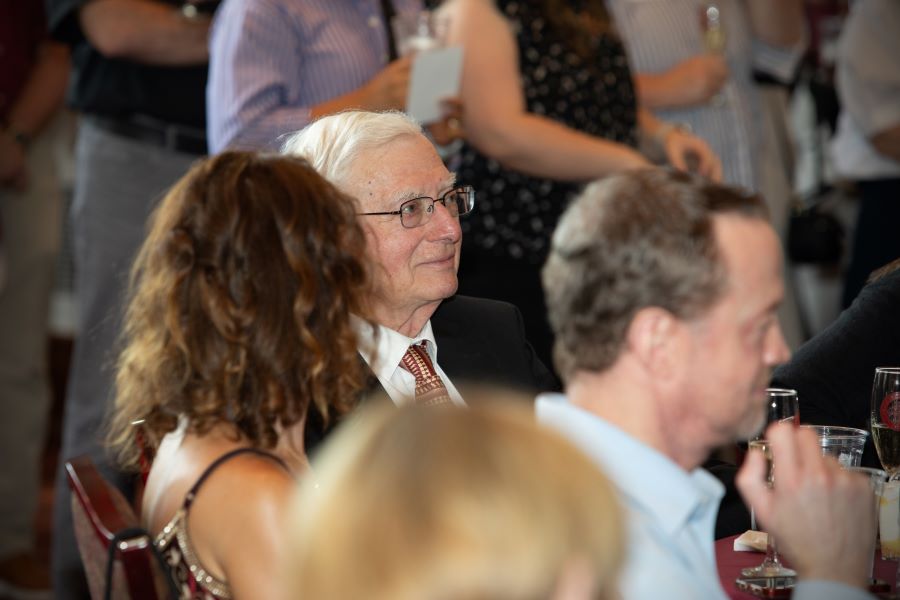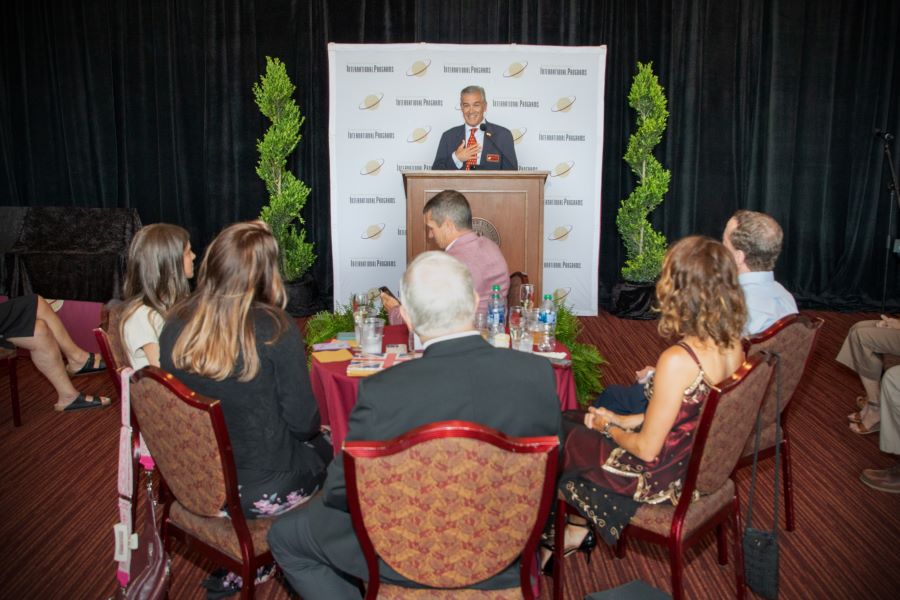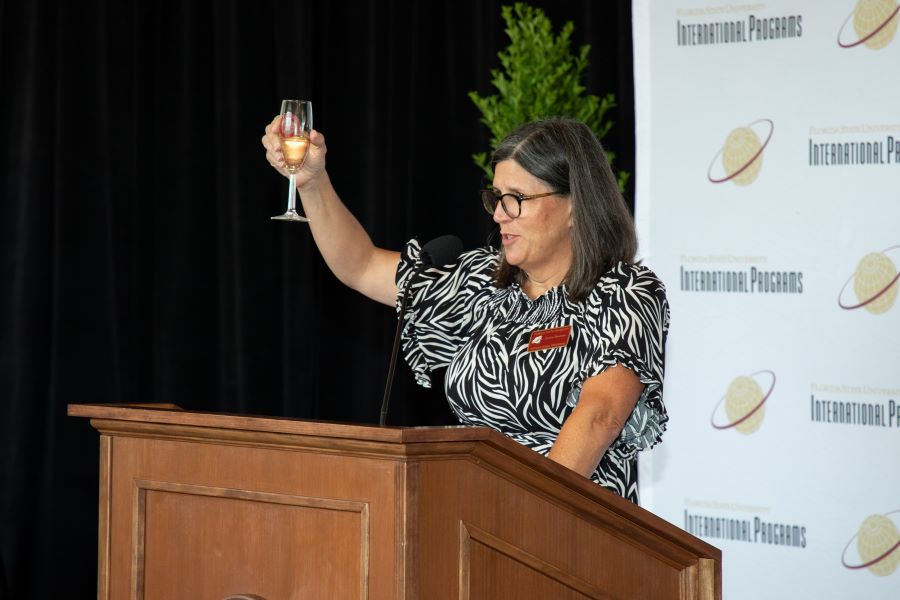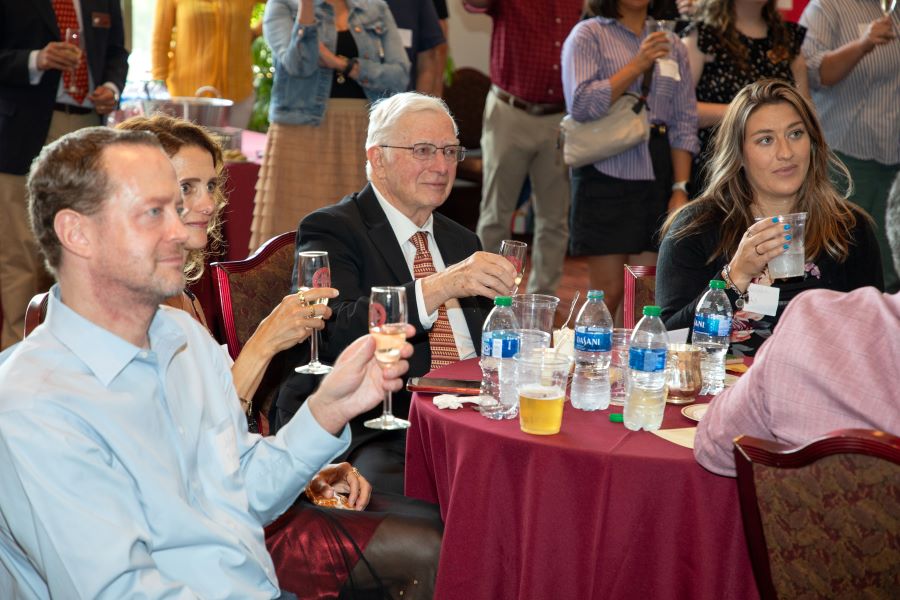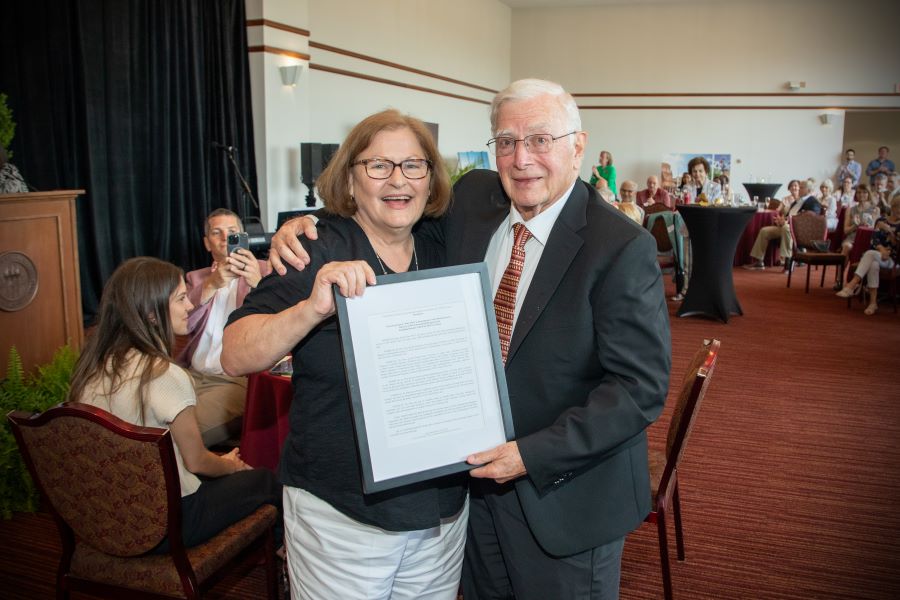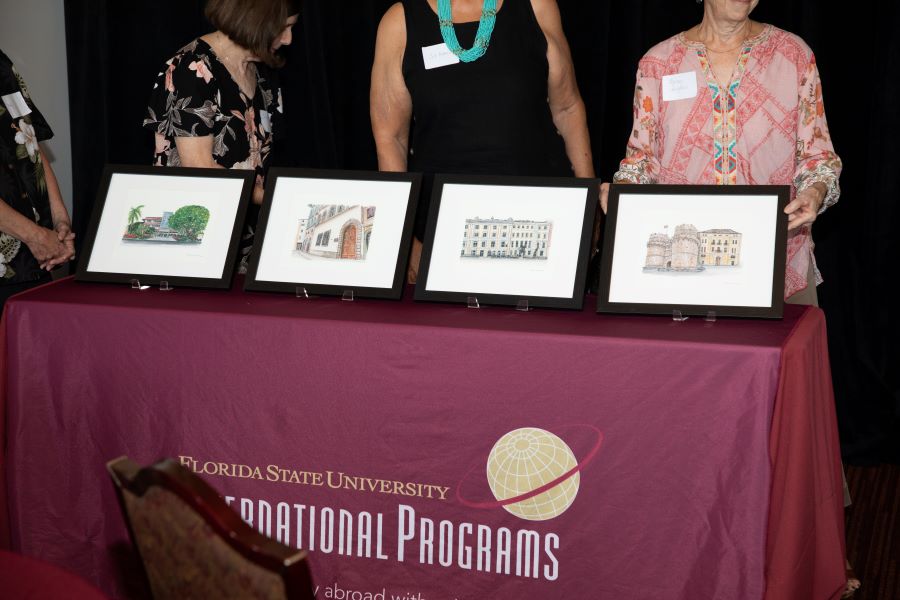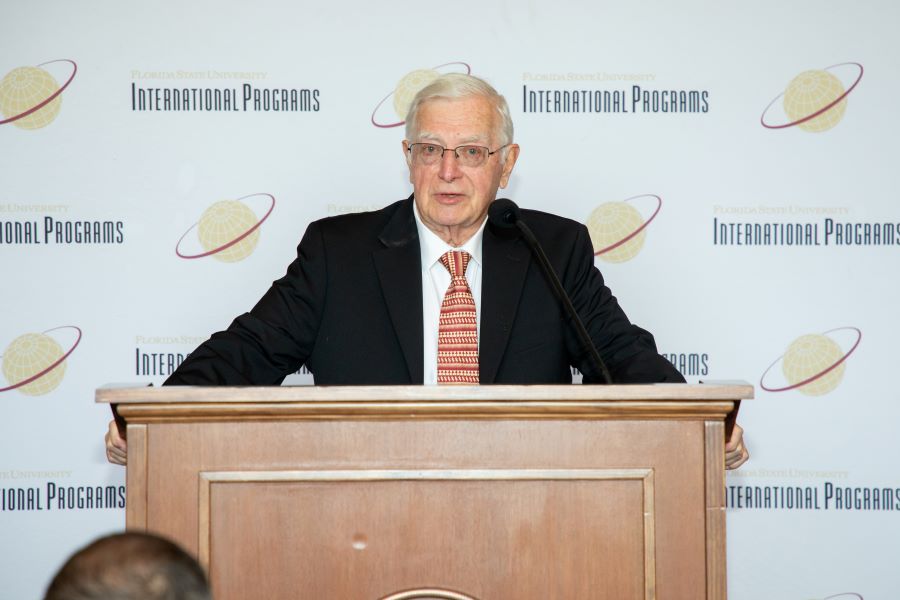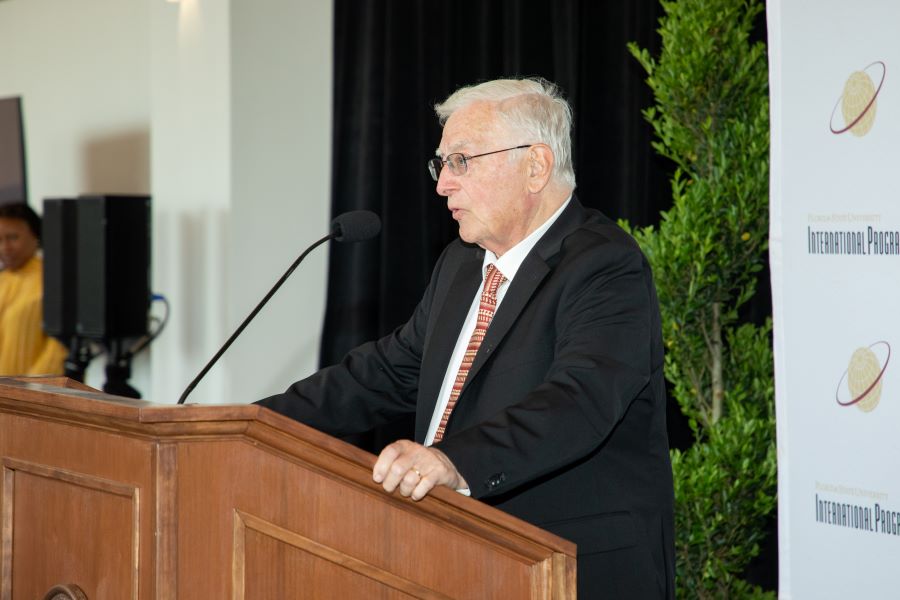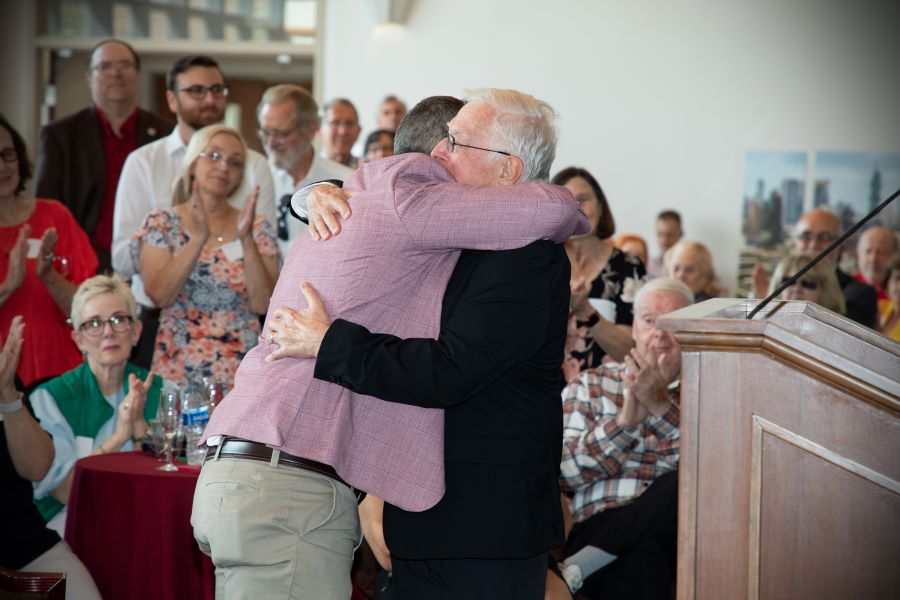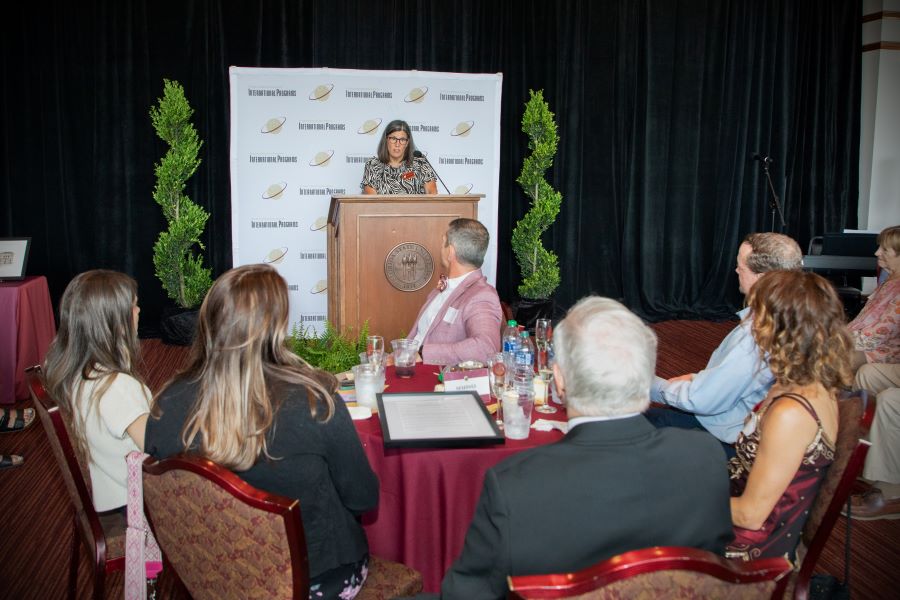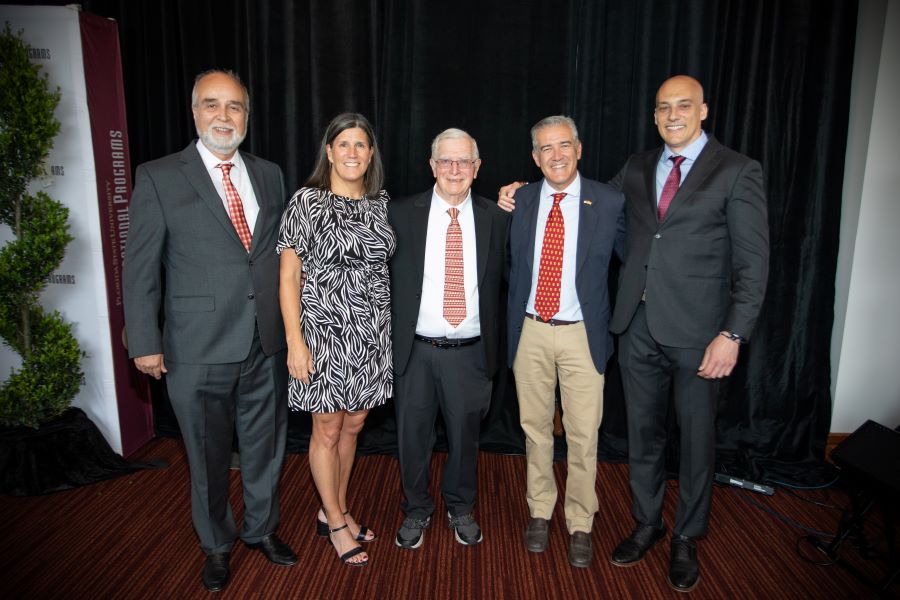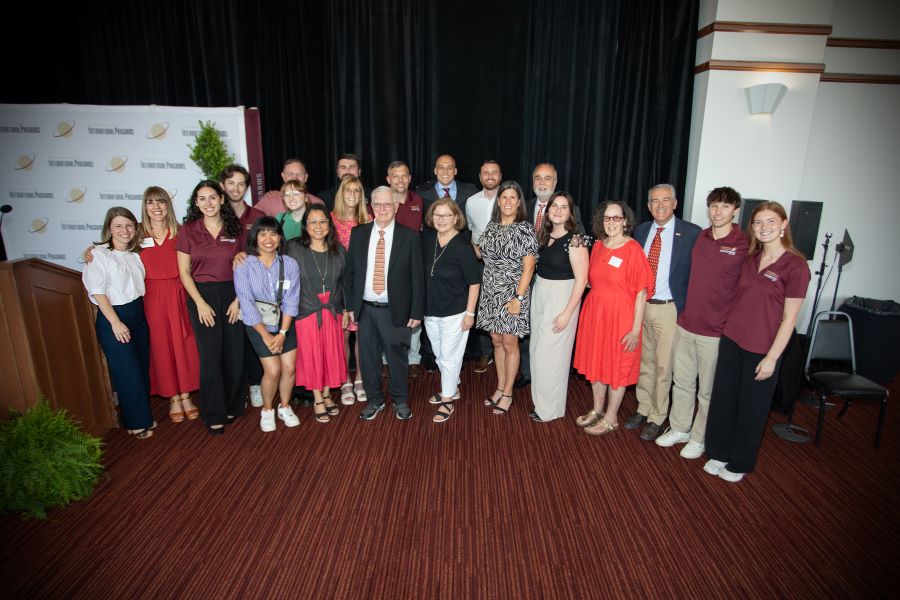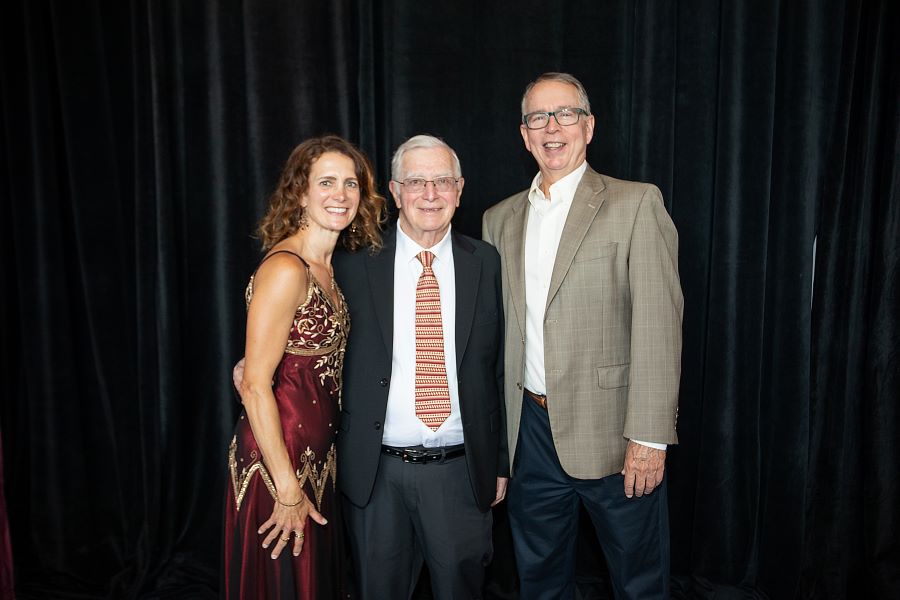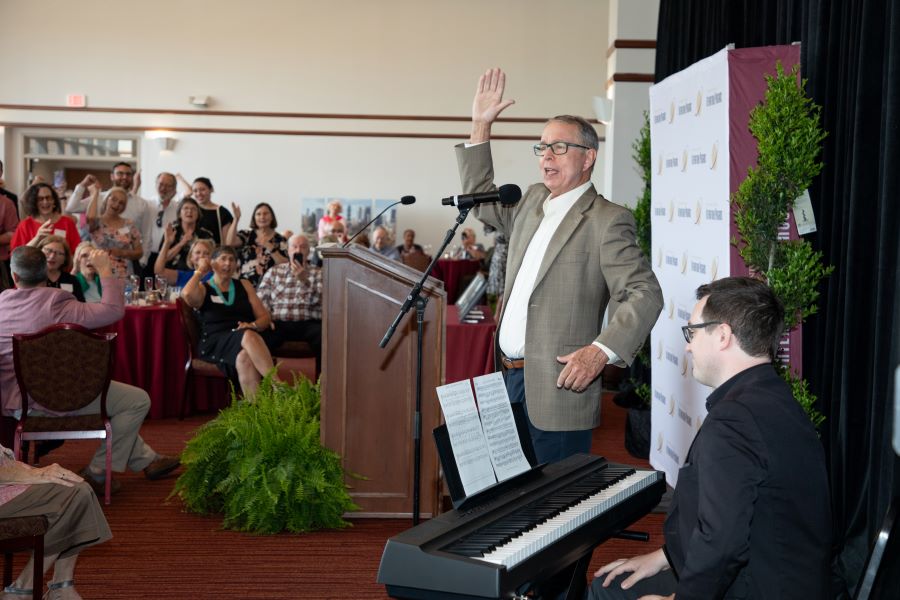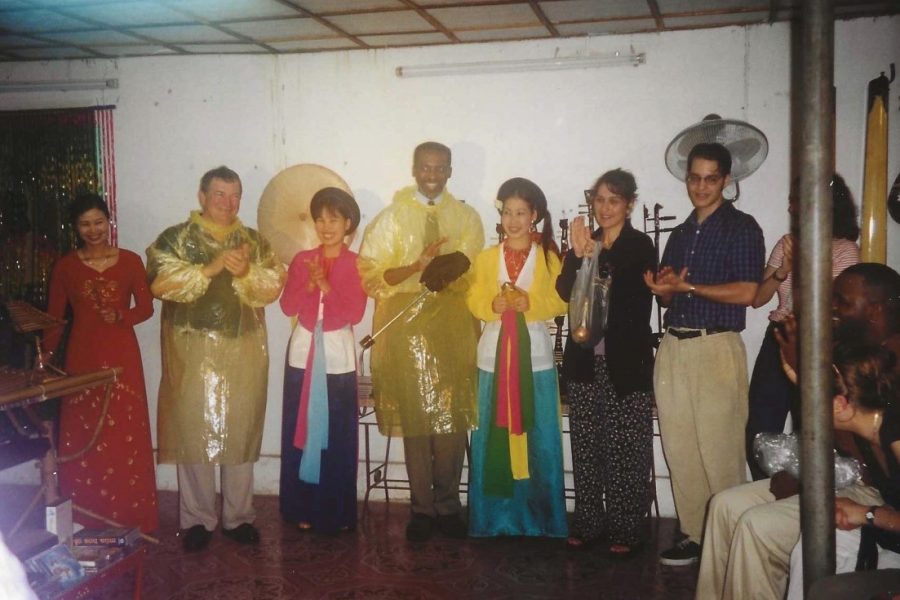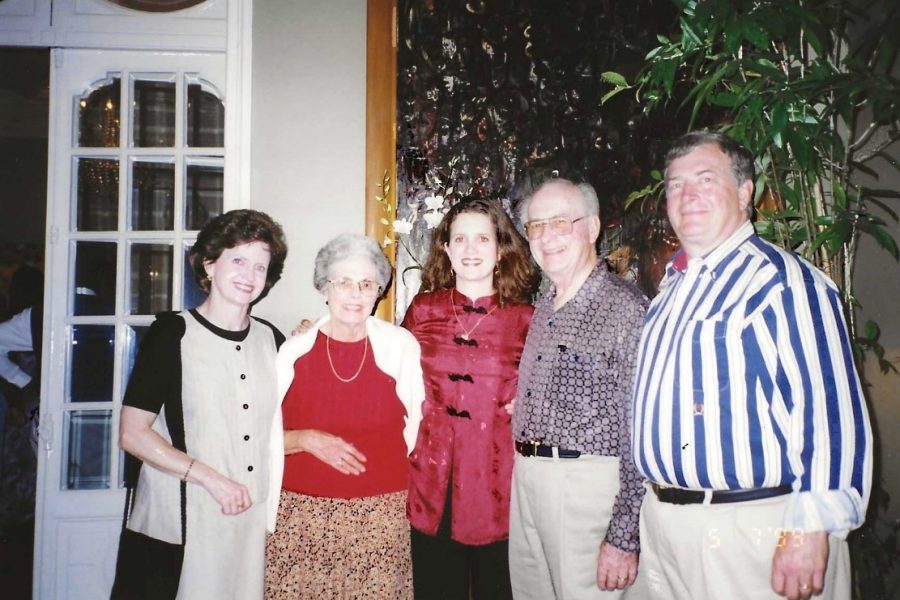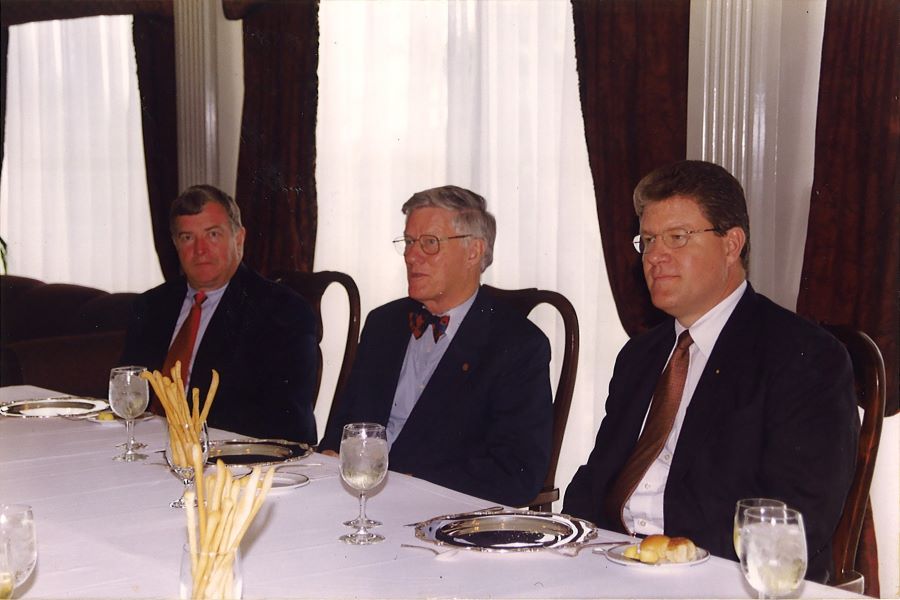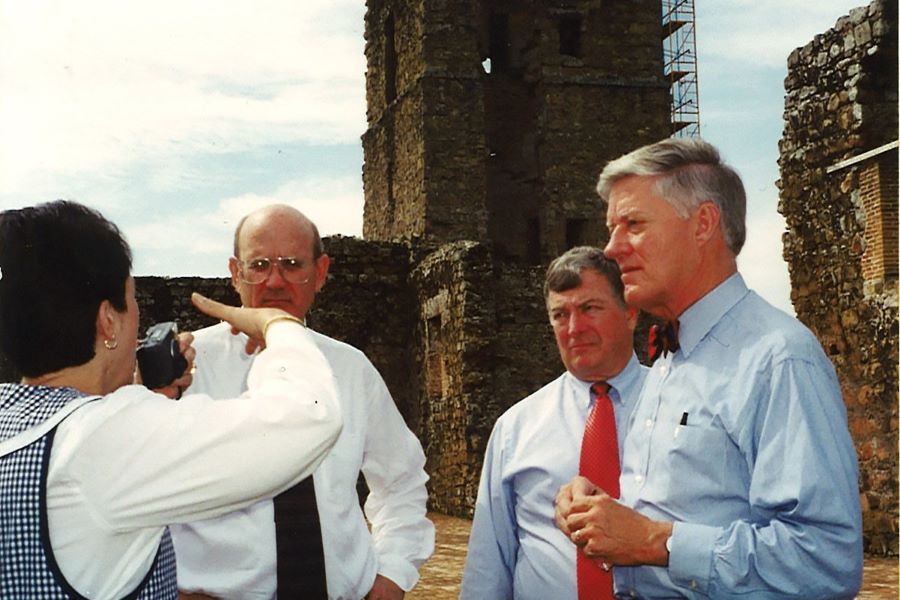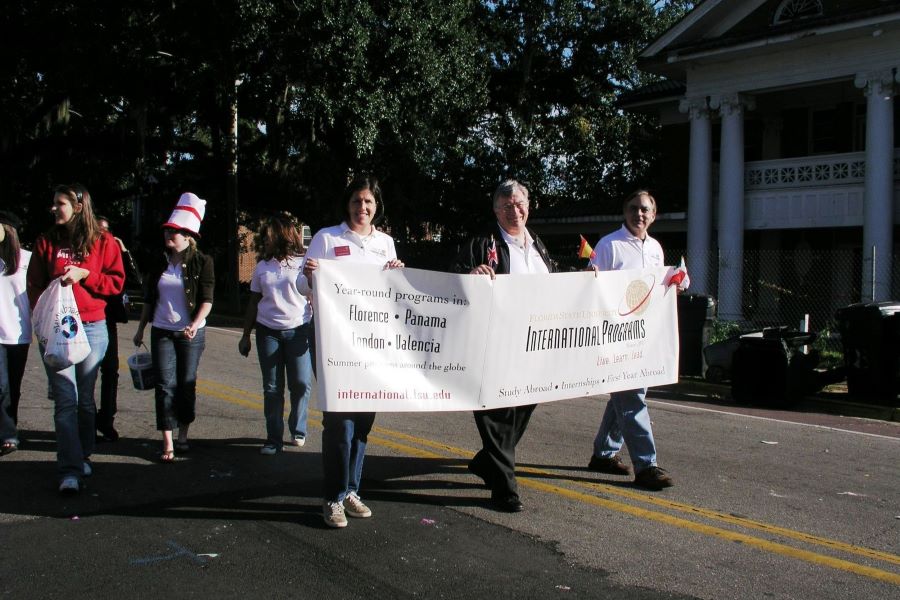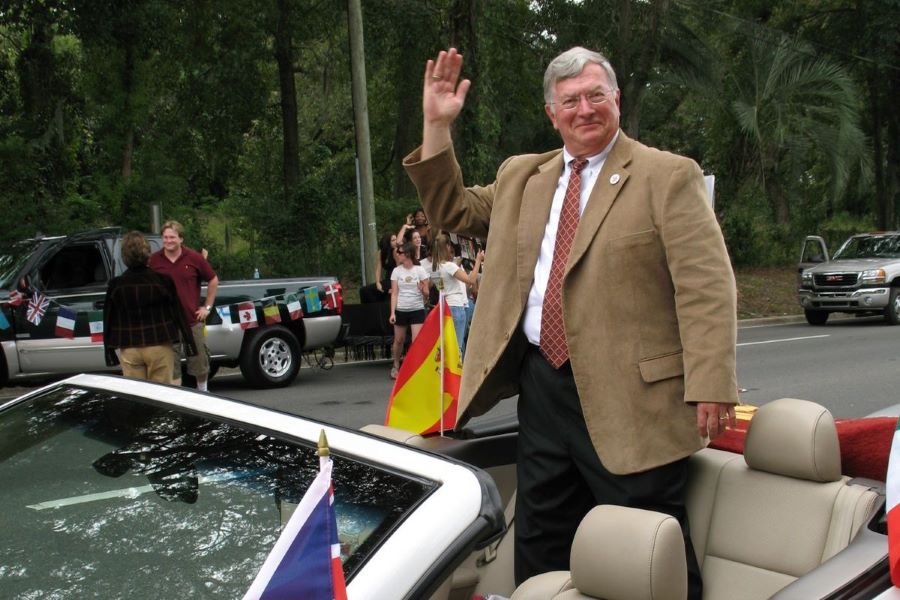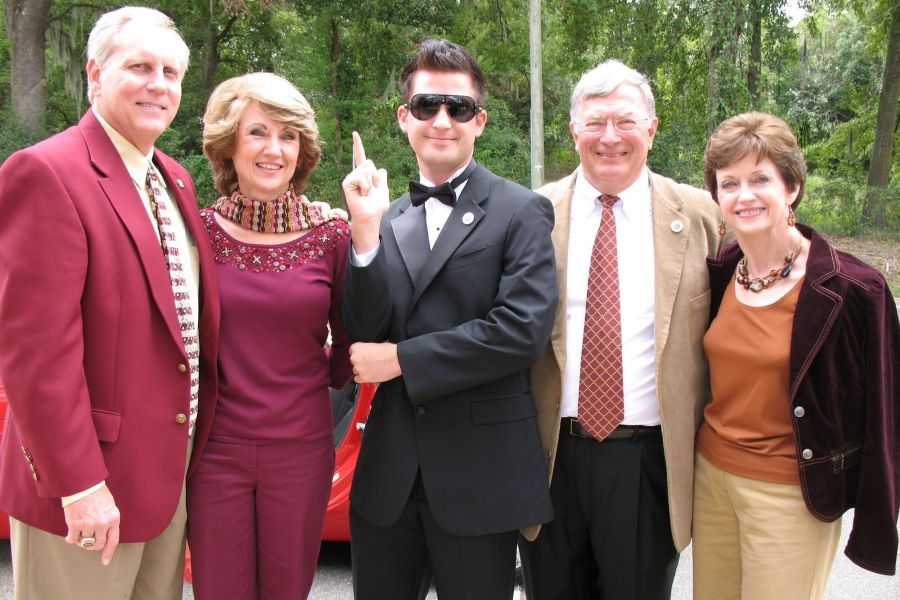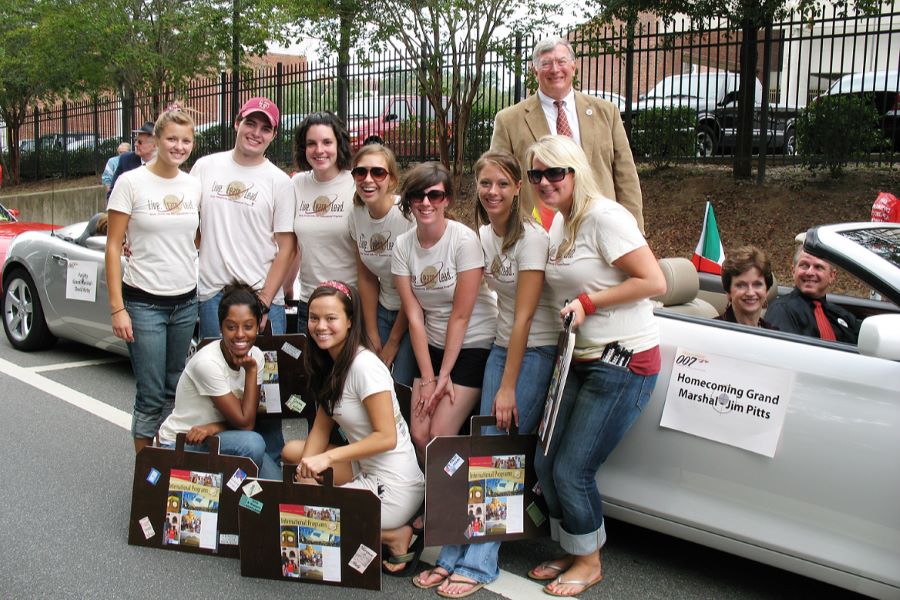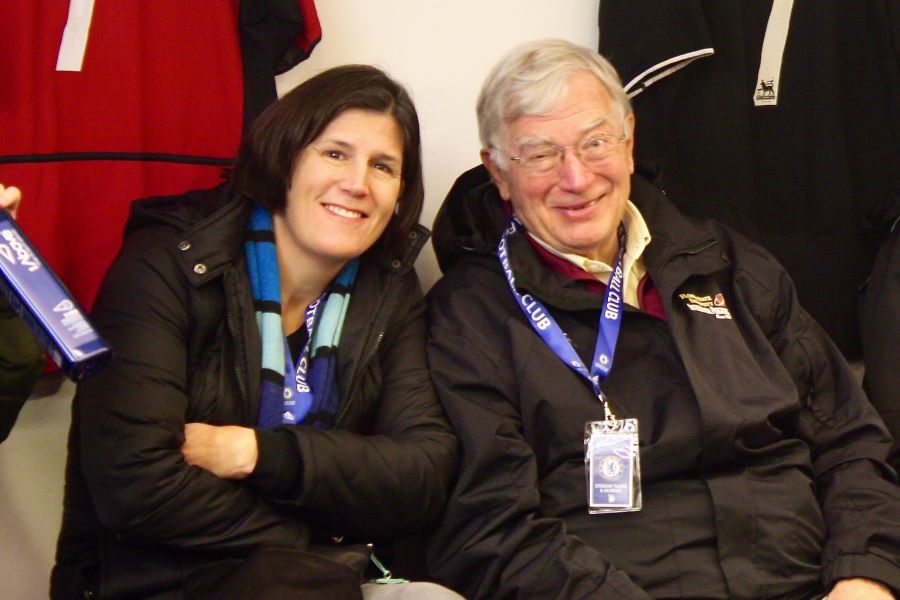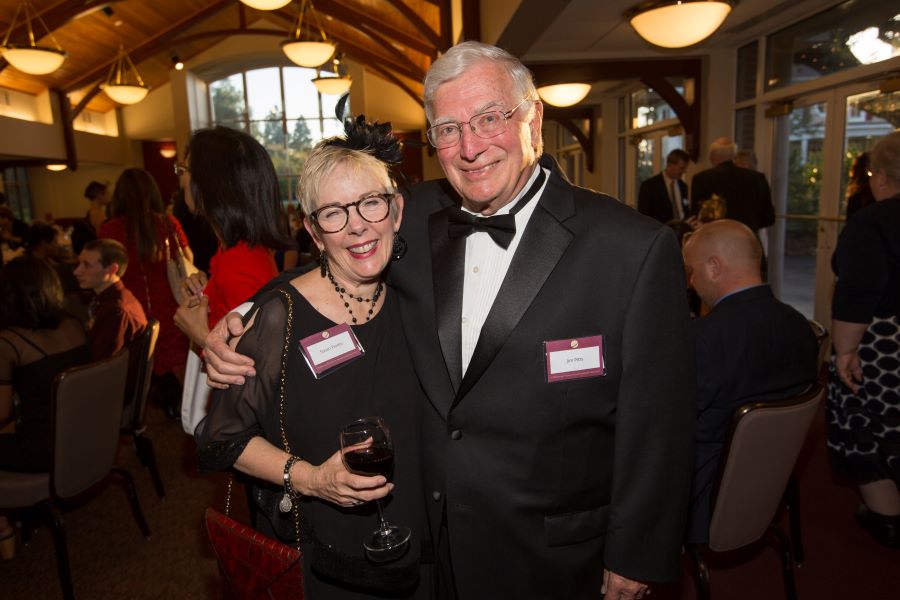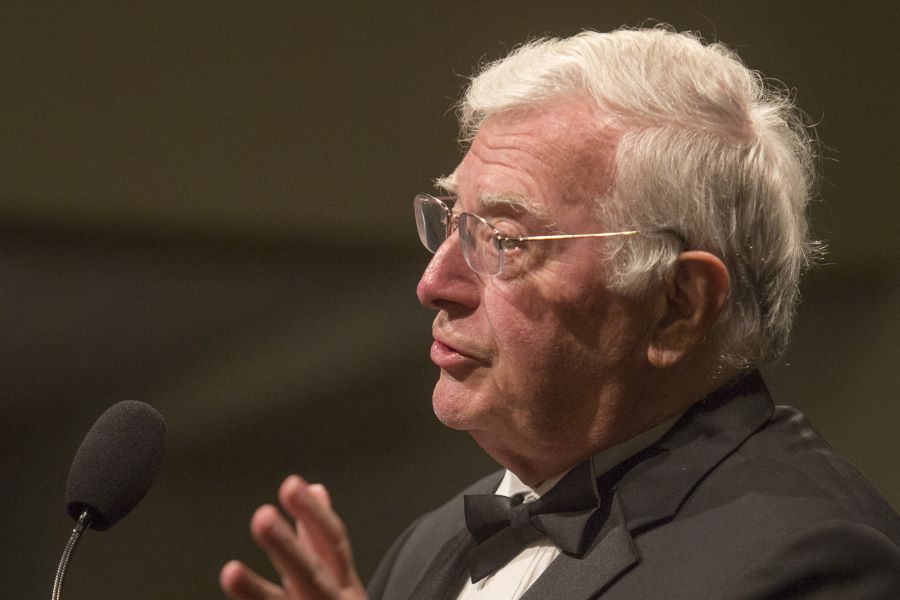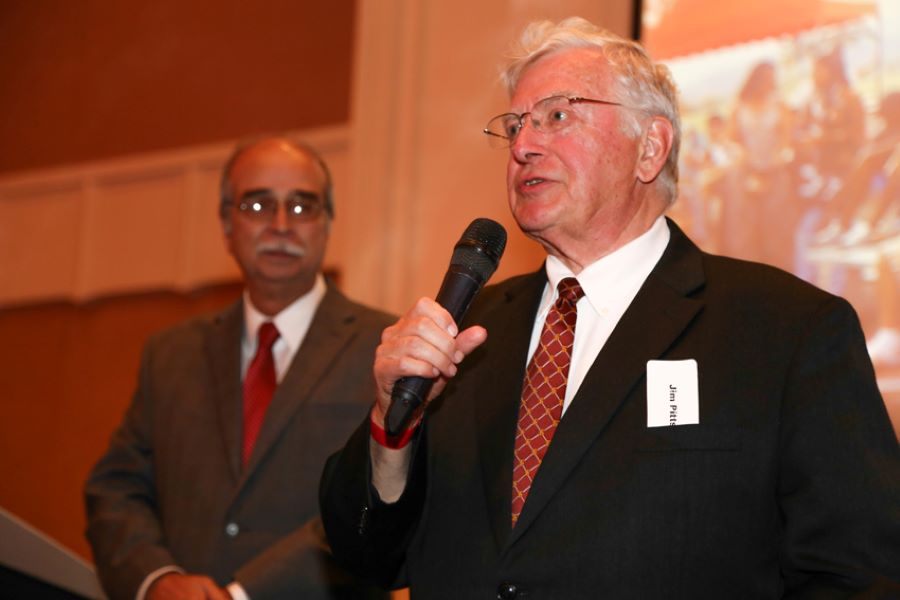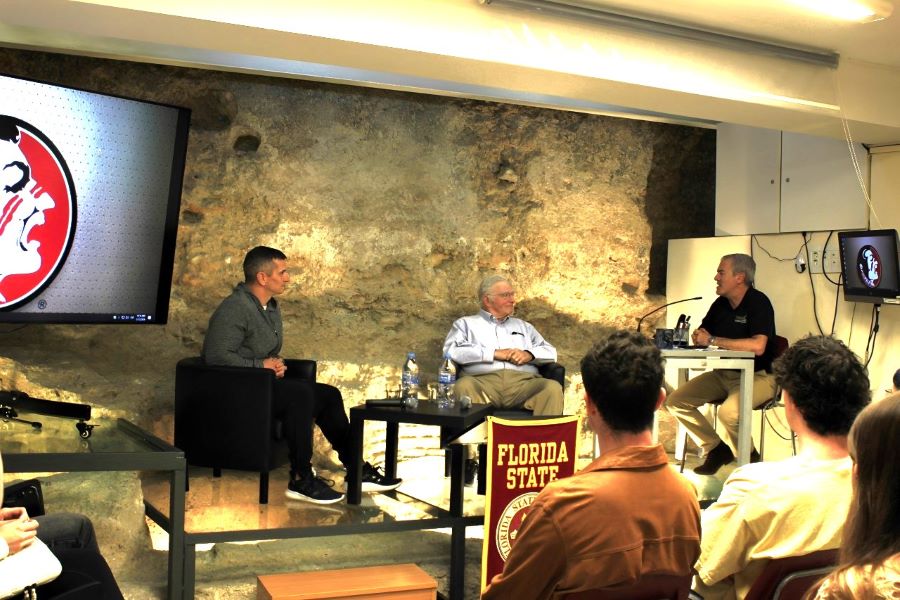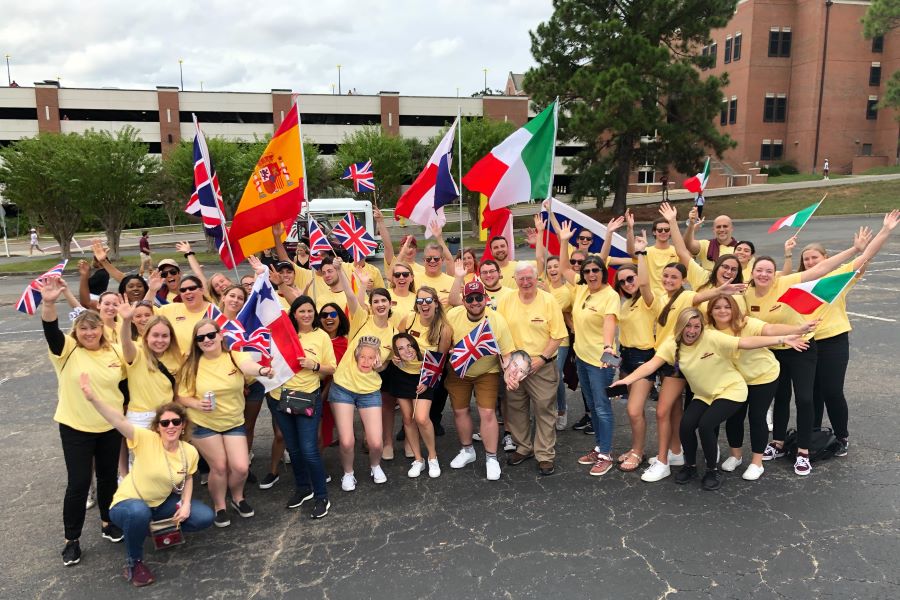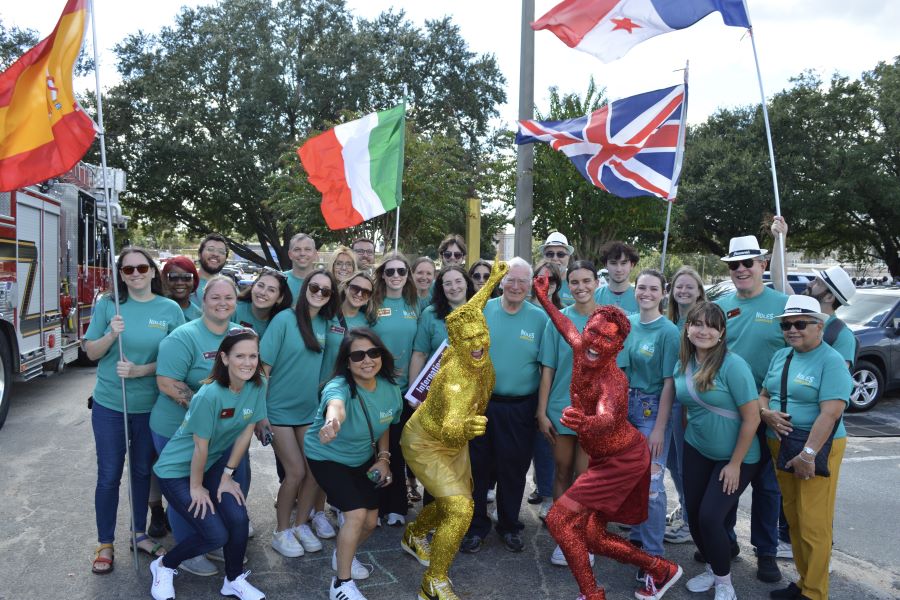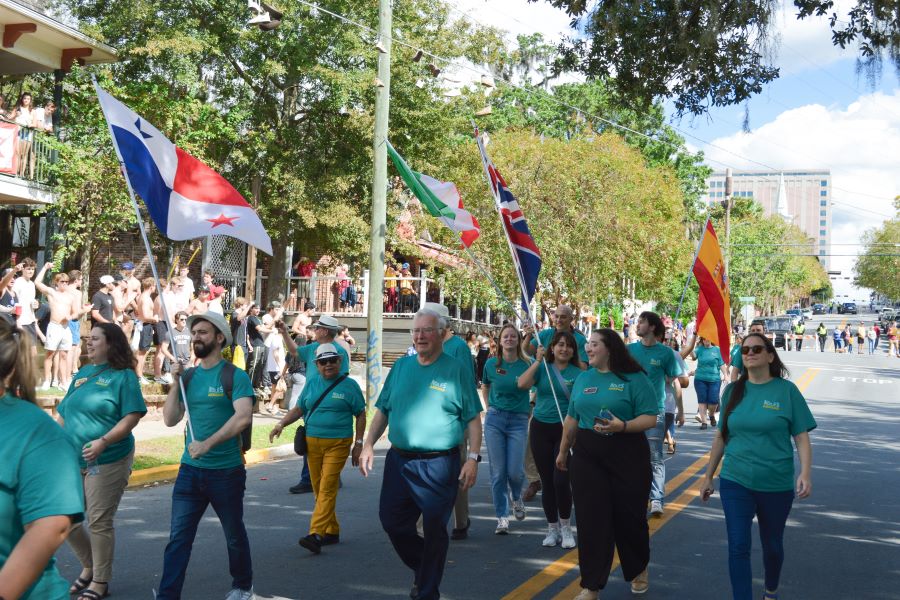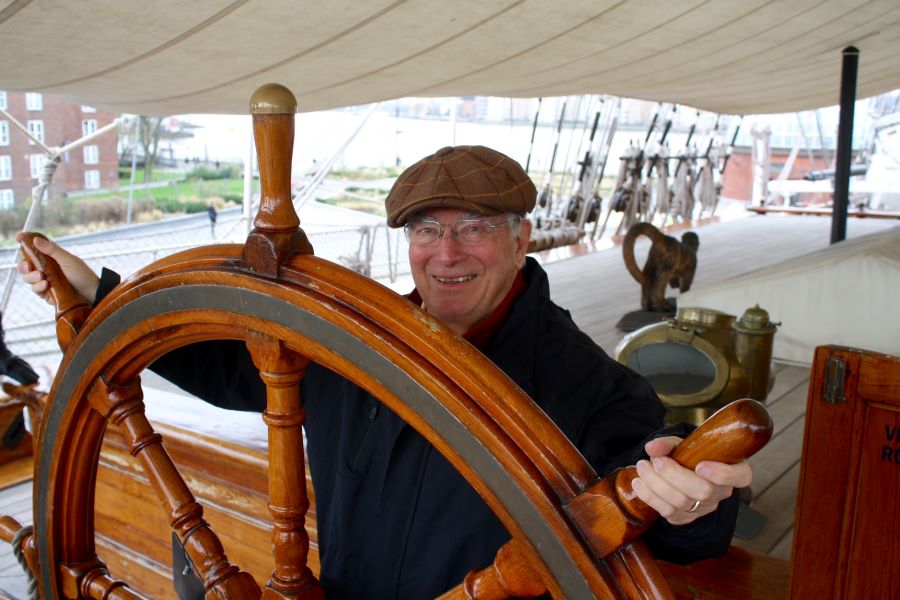
For Jim Pitts, the greatest return on investment in study abroad has always been its impact on students and faculty.
As director of International Programs at Florida State University since 1995, Pitts has traveled the world while steering the organization to sound success. Now, after more than five decades at Florida State, Pitts is stepping down from the helm and into retirement. His last day is June 30.
The university honored Pitts for over 50 years of service during a celebration Friday, June 7, at Miller Hall in the DeVoe L. Moore University Center.
“On behalf of the entire FSU community and in concert with President McCullough, I wanted to thank you for your extraordinary service and congratulate you on your well-deserved retirement,” said James Clark, FSU’s provost and vice president for Academic Affairs. “We all wish you the best as you embark on a new chapter of life, but remember, you’ll always be a part of the FSU family.”
FSU International Programs offers study abroad opportunities in locations across the world, including study centers in London, Florence and Valencia, a branch campus in the Republic of Panama and faculty-led programs in over 20 locations. Despite visiting over 45 countries, Pitts did not originally seek a globe-trotting profession.
“It’s been an interesting career,” he said.
A native of Louisville, Pitts earned his Ph.D. in economics from the University of Kentucky in 1968 before taking a job as an assistant professor in FSU’s College of Business. He was an active faculty member, serving three stints as president of the Faculty Senate (1976-1977, 1978-1979 and 1987-1988) and several years on FSU’s Athletics Board. As a board member in 1987, Pitts put forth the motion to recommend the addition of a varsity soccer program to FSU’s athletics roster.
Eventually he was noticed by Bernie Sliger, FSU’s 10th president (1977 to 1991). Pitts served as assistant to the president for oversight before being named FSU’s vice president for Advancement in 1989, overseeing the Seminole Boosters, the Foundation, and the Alumni Association. In this position, Pitts became chairman of the University Center Building Committee and supervised the largest single expansion ever to FSU’s campus.
As chairman, Pitts adeptly navigated the push and pull between academics and athletics behind the scenes. Today, the DeVoe L. Moore University Center is home to several FSU colleges, offices, event spaces, classrooms, athletic training rooms and the International Programs offices. Combined with Doak S. Campbell Stadium, the center makes up the second-largest continuous brick structure in the world, with the first being the Great Wall of China.
In 1991, President Sliger called Pitts into his office and asked if he would go to London and buy a campus for the university.
“I told him I would go, but I would have to get a passport first,” said Pitts, who at the time had traveled around the U.S. a great deal but had not been to areas requiring a passport.
FSU’s presence in London first started in 1971, when students arrived for a six-month study abroad program based at a hotel in the Earl’s Court district. The program relocated to the South Kensington district in the early 1980s and continued there until Pitts purchased what would become the FSU London Study Centre in 1991.
Located in the Bloomsbury district, an area famous for its cultural and educational history, the four 17th-century townhouses were renovated and refurbished into a suite of offices, classrooms and student accommodations. The first students took up residence in 1993.
“The value of giving Florida State University a splendid permanent home in the heart of historic Bloomsbury 75 yards from the British Museum and walking distance from the great theaters of London cannot be overstated,” said Mary Balthrop, an FSU alumna who was a student in FSU’s first London program in 1971 and served as director of the FSU London Study Centre from 2002 to 2004.
The purchase of the FSU London Study Centre marked the beginning of FSU’s International Programs as it is known today. To make the purchase, FSU created a direct support organization, Florida State University International Programs Association, Inc. That organization issued a tax-free bond to fund the purchase with Pitts as the initial treasurer — a position that he held until recently. Later, in 1995, Pitts became director of International Programs.
Pitts spent the summer of 1993 in London overseeing restoration efforts and teaching a couple courses. At the same time, a graduate student in the College of Education (now the College of Education, Health, and Human Sciences) was interning at the Fulbright Commission in London. Her name was Louisa Blenman.
Blenman came back to work for International Programs in 2004, after spending nearly a decade working in study abroad in London. She is now the organization’s interim director.
“Jim has a remarkable combination of vision, financial acumen and administrative savvy,” Blenman said. “These attributes have not only been central to my own career development, but they have also resulted in FSU being uniquely positioned in the field of study abroad. Equally as important as all these impressive qualities, Jim is a kind, thoughtful, fun-loving, family man, which helps make ‘IP (International Programs)’ the best place I can imagine working. Because of his leadership and guidance, I can better serve our university, faculty and students as we explore ways to enhance FSU’s global offerings and reputation. I will always be grateful to Jim for the opportunities he provided to countless students, faculty, and staff, including me.”
Pitts has overseen tremendous growth at International Programs. FSU now ranks No. 3 among public universities for study abroad enrollments, with 2,469 students studying abroad during the 2021-2022 academic year.
Once Pitts was named director of International Programs, the organization assumed responsibility for several pre-existing programs, including one in Italy that started after the Flying High Circus toured Europe in 1964. The Hotel Capri was FSU’s first home in Florence in 1966, when the Great Flood of Florence happened. Rather than disband the program, FSU students and faculty assisted in recovery efforts, earning the title of “Mud Angels” from Florentines.
After International Programs took over the Italy program, Pitts started looking to purchase a study center there, too. After over 20 years of searching, the Palazzo Bagnesi Falconeri, a 37,000 square-foot palace, opened as the FSU Florence Study Center in 2021.
“It’s amazing how much you can feel his passion, his dedication, to our students and to the staff,” said Charlie Panarella, director of the FSU Florence Study Center. “There was a visiting faculty member who came to Florence that stated that leadership is ‘a philosophy and not a title.’ I think Dr. Pitts embodies that. It’s incredible how much he’s impacted so many lives over the past five decades.”
In 2000, International Programs assumed responsibility for FSU’s branch campus in the Republic of Panama. FSU had operated in the region since 1957 through a contract with the U.S. Department of Defense to teach military servicemen and their families stationed in the Canal Zone. When the U.S. reverted control of the Panama Canal to the Republic of Panama, FSU decided to maintain operations without the contract.
FSU Panama moved to its current location in the City of Knowledge in 2009. Today, FSU Panama serves around 500 students from 30 different countries each academic year.
“Jim has been going to Panama for about 25 years, and I don’t recall him ever missing a commencement in Panama, which is remarkable to me,” said Carlos Langoni, rector of FSU Panama. “His love for this institution, his love for the study centers and for the branch campus in Panama — you don’t see that sense of responsibility everywhere. He’s an incredible leader.”
In 1997, the Department of Modern Languages and Linguistics started a program in Spain that Pitts wanted to expand. In 1999, the cohort studying in Madrid visited Valencia for the first time and fell in love with the city. The program director on the trip called Pitts and suggested he look into Valencia as a potential site for a study center. In 2000, the FSU Spain program permanently moved to Valencia.
Ignacio Messana, director of the FSU Valencia Study Center, first met Pitts during a phone interview in 2000, which Messana conducted from a telephone booth. Messana became director in 2002.
“You taught us to be fair, to be passionate, to be kind, to be good to each other, to be very professional but at the same time to use a personal touch, and always give priority, as a team, to the students and the faculty,” Messana told Pitts during the celebration. “We grew in the teamwork and the camaraderie that you taught us.”
Pitts went on to purchase FSU’s first building in the heart of the historical district of Valencia in 2004. After integral renovations, the Garnet Study Center and apartment building was inaugurated by Pitts and then-FSU President T.K. Wetherell in the summer of 2007. The first cohort of students to reside in the building arrived that fall.
In 2013, International Programs purchased a second study center and apartment building. The Gold Study Center received its first students in summer 2014.
Of the more than 45 countries Pitts has visited, one of his most fascinating travels was to Vietnam. In 1999, he worked with Vietnam’s Ministry of Culture to organize several performances in Vietnam by the University Singers, FSU’s premier undergraduate touring choir. Under the auspices of International Programs, a delegation of 104 embarked to Vietnam to become the first U.S. college choir to perform in the country since the war.
Included in the delegation was Pitts and his daughter, an FSU student at the time and member of the University Singers. Also included in the delegation was a Vietnamese American whose grandmother lived in the Mekong Delta. Upon learning this, Pitts arranged a meeting for them in Ho Chi Minh City.
“It was a powerful moment,” Pitts said.
He attributes his coming to FSU in 1968 to the wisdom of his wife, Martha. They’ve been die-hard FSU fans ever since, sending all three of their children to study abroad through International Programs and being ardent supporters of FSU Athletics.
In 2007, Pitts led FSU’s Homecoming Parade as Grand Marshal, and in 2012 he was awarded the Bernard F. Sliger Award, named after FSU’s 10th president, who had asked Pitts to purchase the property in London. It’s the single highest honor given by the FSU Alumni Association. He was also inducted into the FSU Alumni Association’s Circle of Gold in 1998, which recognizes worthy individuals who, through their service and achievements, personify the university’s tradition of excellence.
Under Pitts’ leadership, more than 50,000 FSU students have studied abroad through International Programs.
“It’s certainly been wonderful watching students develop and change their perception of the world,” Pitts said.
Retirement for Pitts means moving to Seminole, Florida (“because you can’t take the Seminole out of me,” he said), where two of his three children live, including his youngest son and daughter-in-law. They are expecting Pitts’ first grandchild on Labor Day this September, an occasion that will most likely cause him to miss FSU’s first home football game this season.
“I still have my tickets, but I think I’ll be enjoying their fellowship and my grandson at that point,” he said.
To commemorate his legacy, International Programs established the James E. Pitts Directors Endowed Fund to bolster the remarkable efforts of the teams in Panama, Florence, Valencia, and London. To donate, visit this link or reach out to Mafé Brooks at mbrooks@fsu.edu.




